Professional Skills Portfolio (PRSK4048) - Desklib
VerifiedAdded on 2023/06/10
|21
|7705
|82
AI Summary
The Professional Skills Portfolio (PRSK4048) consists of two sections: Portfolio Evidence and Written Tasks. The Portfolio Evidence includes tasks related to teamwork, professional ethics, and project management. The Written Tasks include Professional Skills In Action and Your Professional Skills. The total word count is 3,200 words. The Code of Conduct and Gantt Chart should be completed in collaboration with group members. The portfolio aims to improve professional skills and self-reflection.
Contribute Materials
Your contribution can guide someone’s learning journey. Share your
documents today.
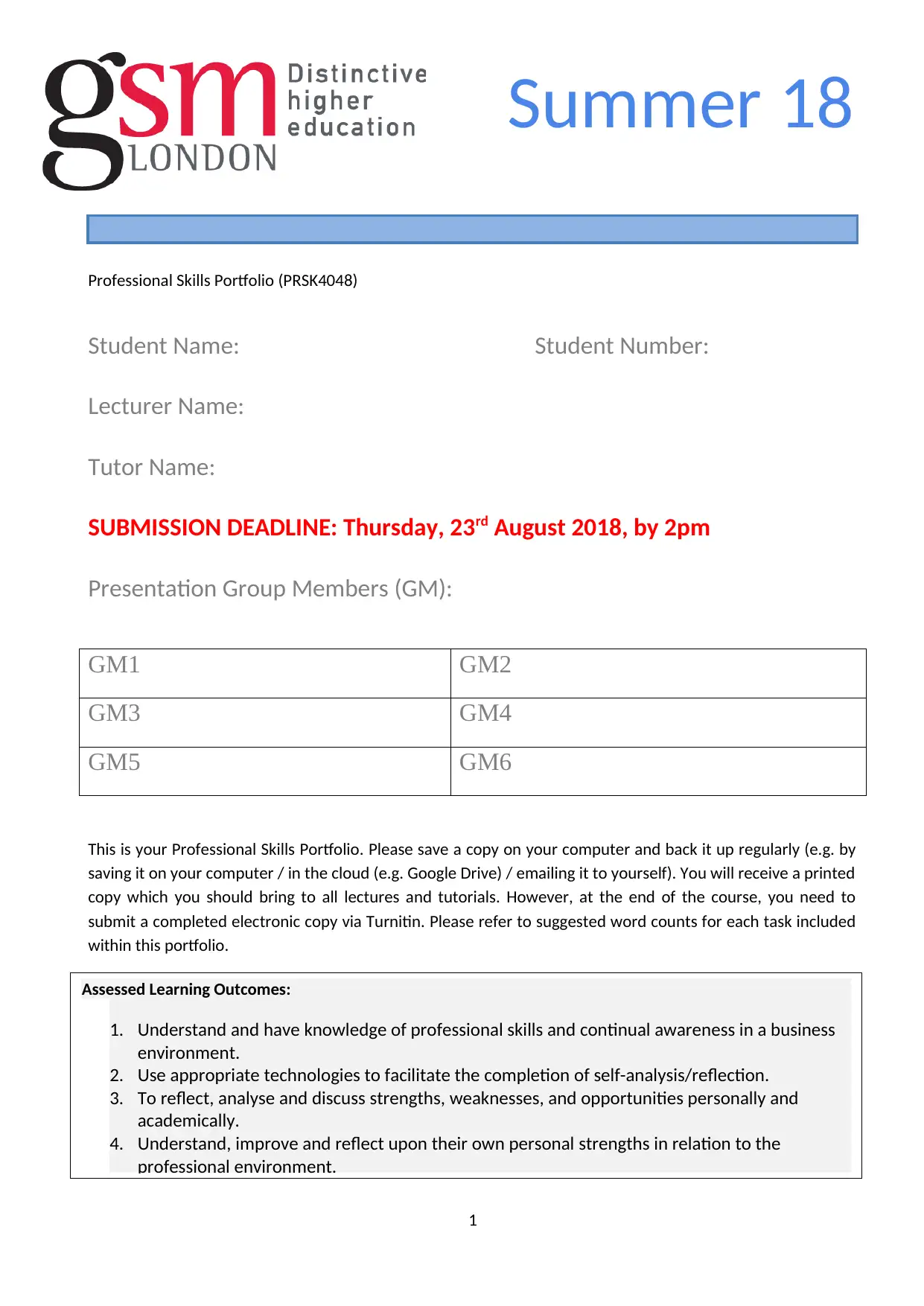
Summer 18
Professional Skills Portfolio (PRSK4048)
Student Name: Student Number:
Lecturer Name:
Tutor Name:
SUBMISSION DEADLINE: Thursday, 23rd August 2018, by 2pm
Presentation Group Members (GM):
GM1 GM2
GM3 GM4
GM5 GM6
This is your Professional Skills Portfolio. Please save a copy on your computer and back it up regularly (e.g. by
saving it on your computer / in the cloud (e.g. Google Drive) / emailing it to yourself). You will receive a printed
copy which you should bring to all lectures and tutorials. However, at the end of the course, you need to
submit a completed electronic copy via Turnitin. Please refer to suggested word counts for each task included
within this portfolio.
1
Assessed Learning Outcomes:
1. Understand and have knowledge of professional skills and continual awareness in a business
environment.
2. Use appropriate technologies to facilitate the completion of self-analysis/reflection.
3. To reflect, analyse and discuss strengths, weaknesses, and opportunities personally and
academically.
4. Understand, improve and reflect upon their own personal strengths in relation to the
professional environment.
Professional Skills Portfolio (PRSK4048)
Student Name: Student Number:
Lecturer Name:
Tutor Name:
SUBMISSION DEADLINE: Thursday, 23rd August 2018, by 2pm
Presentation Group Members (GM):
GM1 GM2
GM3 GM4
GM5 GM6
This is your Professional Skills Portfolio. Please save a copy on your computer and back it up regularly (e.g. by
saving it on your computer / in the cloud (e.g. Google Drive) / emailing it to yourself). You will receive a printed
copy which you should bring to all lectures and tutorials. However, at the end of the course, you need to
submit a completed electronic copy via Turnitin. Please refer to suggested word counts for each task included
within this portfolio.
1
Assessed Learning Outcomes:
1. Understand and have knowledge of professional skills and continual awareness in a business
environment.
2. Use appropriate technologies to facilitate the completion of self-analysis/reflection.
3. To reflect, analyse and discuss strengths, weaknesses, and opportunities personally and
academically.
4. Understand, improve and reflect upon their own personal strengths in relation to the
professional environment.
Secure Best Marks with AI Grader
Need help grading? Try our AI Grader for instant feedback on your assignments.
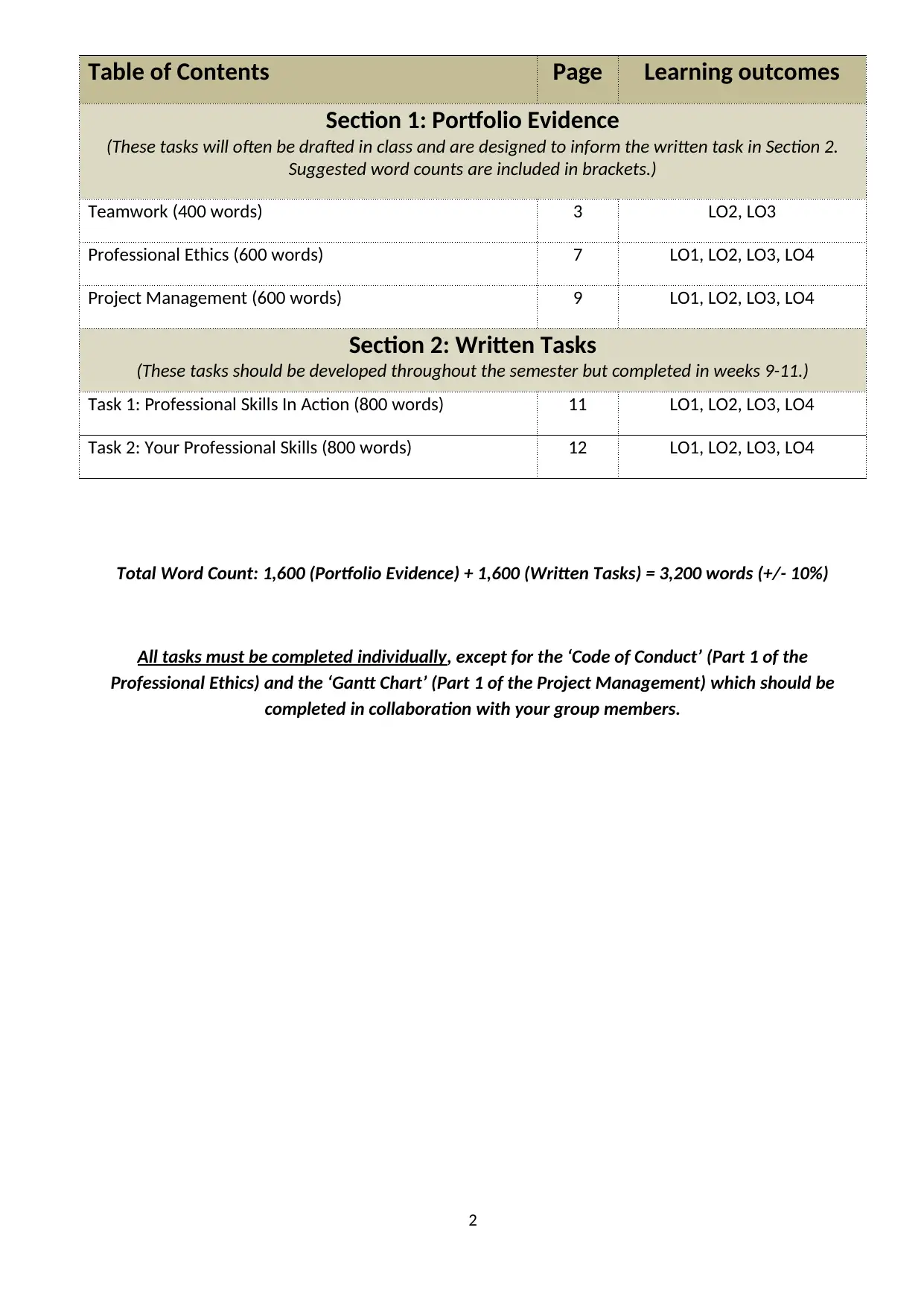
Table of Contents Page Learning outcomes
Section 1: Portfolio Evidence
(These tasks will often be drafted in class and are designed to inform the written task in Section 2.
Suggested word counts are included in brackets.)
Teamwork (400 words) 3 LO2, LO3
Professional Ethics (600 words) 7 LO1, LO2, LO3, LO4
Project Management (600 words) 9 LO1, LO2, LO3, LO4
Section 2: Written Tasks
(These tasks should be developed throughout the semester but completed in weeks 9-11.)
Task 1: Professional Skills In Action (800 words) 11 LO1, LO2, LO3, LO4
Task 2: Your Professional Skills (800 words) 12 LO1, LO2, LO3, LO4
Total Word Count: 1,600 (Portfolio Evidence) + 1,600 (Written Tasks) = 3,200 words (+/- 10%)
All tasks must be completed individually, except for the ‘Code of Conduct’ (Part 1 of the
Professional Ethics) and the ‘Gantt Chart’ (Part 1 of the Project Management) which should be
completed in collaboration with your group members.
2
Section 1: Portfolio Evidence
(These tasks will often be drafted in class and are designed to inform the written task in Section 2.
Suggested word counts are included in brackets.)
Teamwork (400 words) 3 LO2, LO3
Professional Ethics (600 words) 7 LO1, LO2, LO3, LO4
Project Management (600 words) 9 LO1, LO2, LO3, LO4
Section 2: Written Tasks
(These tasks should be developed throughout the semester but completed in weeks 9-11.)
Task 1: Professional Skills In Action (800 words) 11 LO1, LO2, LO3, LO4
Task 2: Your Professional Skills (800 words) 12 LO1, LO2, LO3, LO4
Total Word Count: 1,600 (Portfolio Evidence) + 1,600 (Written Tasks) = 3,200 words (+/- 10%)
All tasks must be completed individually, except for the ‘Code of Conduct’ (Part 1 of the
Professional Ethics) and the ‘Gantt Chart’ (Part 1 of the Project Management) which should be
completed in collaboration with your group members.
2
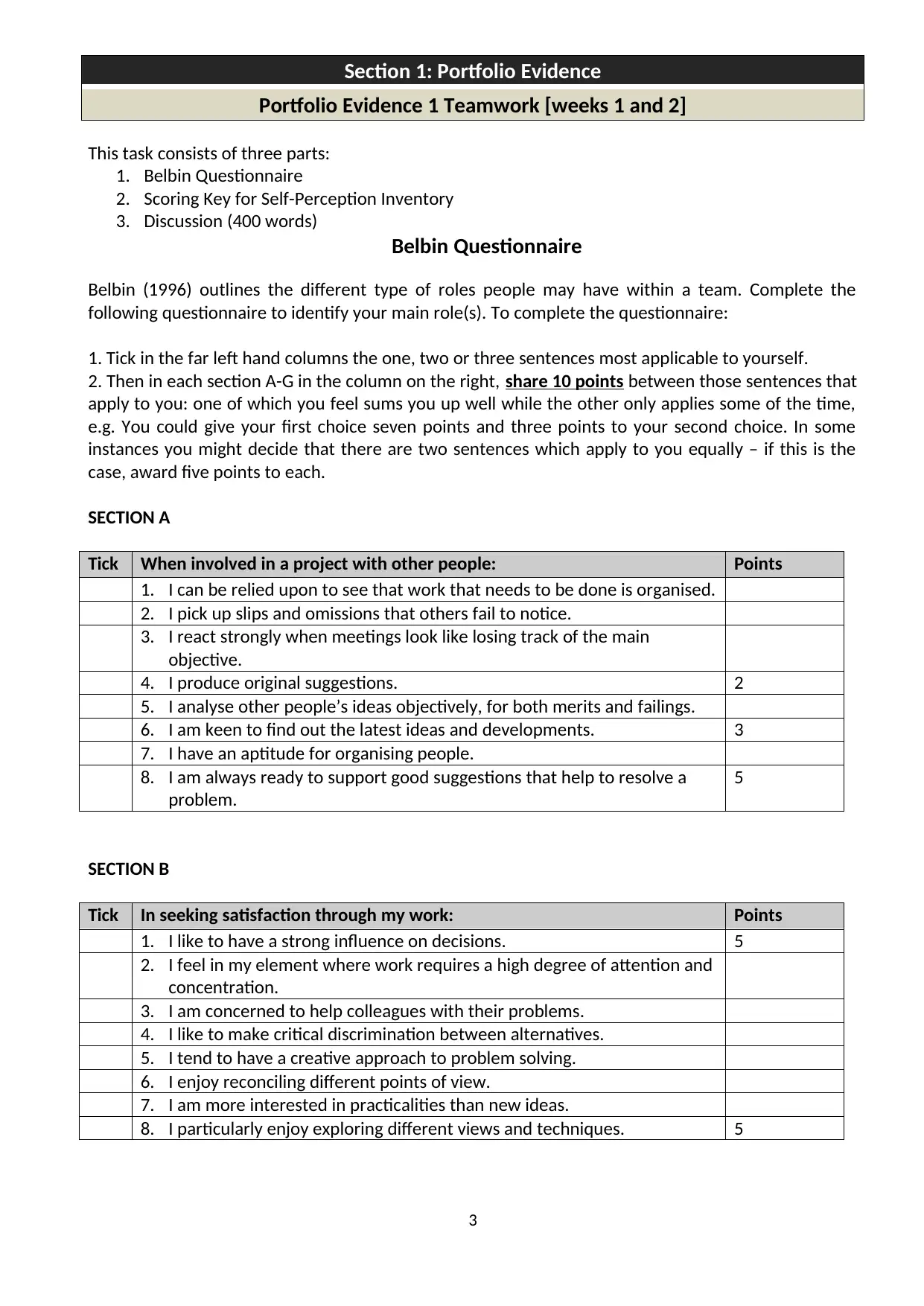
Section 1: Portfolio Evidence
Portfolio Evidence 1 Teamwork [weeks 1 and 2]
This task consists of three parts:
1. Belbin Questionnaire
2. Scoring Key for Self-Perception Inventory
3. Discussion (400 words)
Belbin Questionnaire
Belbin (1996) outlines the different type of roles people may have within a team. Complete the
following questionnaire to identify your main role(s). To complete the questionnaire:
1. Tick in the far left hand columns the one, two or three sentences most applicable to yourself.
2. Then in each section A-G in the column on the right, share 10 points between those sentences that
apply to you: one of which you feel sums you up well while the other only applies some of the time,
e.g. You could give your first choice seven points and three points to your second choice. In some
instances you might decide that there are two sentences which apply to you equally – if this is the
case, award five points to each.
SECTION A
Tick When involved in a project with other people: Points
1. I can be relied upon to see that work that needs to be done is organised.
2. I pick up slips and omissions that others fail to notice.
3. I react strongly when meetings look like losing track of the main
objective.
4. I produce original suggestions. 2
5. I analyse other people’s ideas objectively, for both merits and failings.
6. I am keen to find out the latest ideas and developments. 3
7. I have an aptitude for organising people.
8. I am always ready to support good suggestions that help to resolve a
problem.
5
SECTION B
Tick In seeking satisfaction through my work: Points
1. I like to have a strong influence on decisions. 5
2. I feel in my element where work requires a high degree of attention and
concentration.
3. I am concerned to help colleagues with their problems.
4. I like to make critical discrimination between alternatives.
5. I tend to have a creative approach to problem solving.
6. I enjoy reconciling different points of view.
7. I am more interested in practicalities than new ideas.
8. I particularly enjoy exploring different views and techniques. 5
3
Portfolio Evidence 1 Teamwork [weeks 1 and 2]
This task consists of three parts:
1. Belbin Questionnaire
2. Scoring Key for Self-Perception Inventory
3. Discussion (400 words)
Belbin Questionnaire
Belbin (1996) outlines the different type of roles people may have within a team. Complete the
following questionnaire to identify your main role(s). To complete the questionnaire:
1. Tick in the far left hand columns the one, two or three sentences most applicable to yourself.
2. Then in each section A-G in the column on the right, share 10 points between those sentences that
apply to you: one of which you feel sums you up well while the other only applies some of the time,
e.g. You could give your first choice seven points and three points to your second choice. In some
instances you might decide that there are two sentences which apply to you equally – if this is the
case, award five points to each.
SECTION A
Tick When involved in a project with other people: Points
1. I can be relied upon to see that work that needs to be done is organised.
2. I pick up slips and omissions that others fail to notice.
3. I react strongly when meetings look like losing track of the main
objective.
4. I produce original suggestions. 2
5. I analyse other people’s ideas objectively, for both merits and failings.
6. I am keen to find out the latest ideas and developments. 3
7. I have an aptitude for organising people.
8. I am always ready to support good suggestions that help to resolve a
problem.
5
SECTION B
Tick In seeking satisfaction through my work: Points
1. I like to have a strong influence on decisions. 5
2. I feel in my element where work requires a high degree of attention and
concentration.
3. I am concerned to help colleagues with their problems.
4. I like to make critical discrimination between alternatives.
5. I tend to have a creative approach to problem solving.
6. I enjoy reconciling different points of view.
7. I am more interested in practicalities than new ideas.
8. I particularly enjoy exploring different views and techniques. 5
3
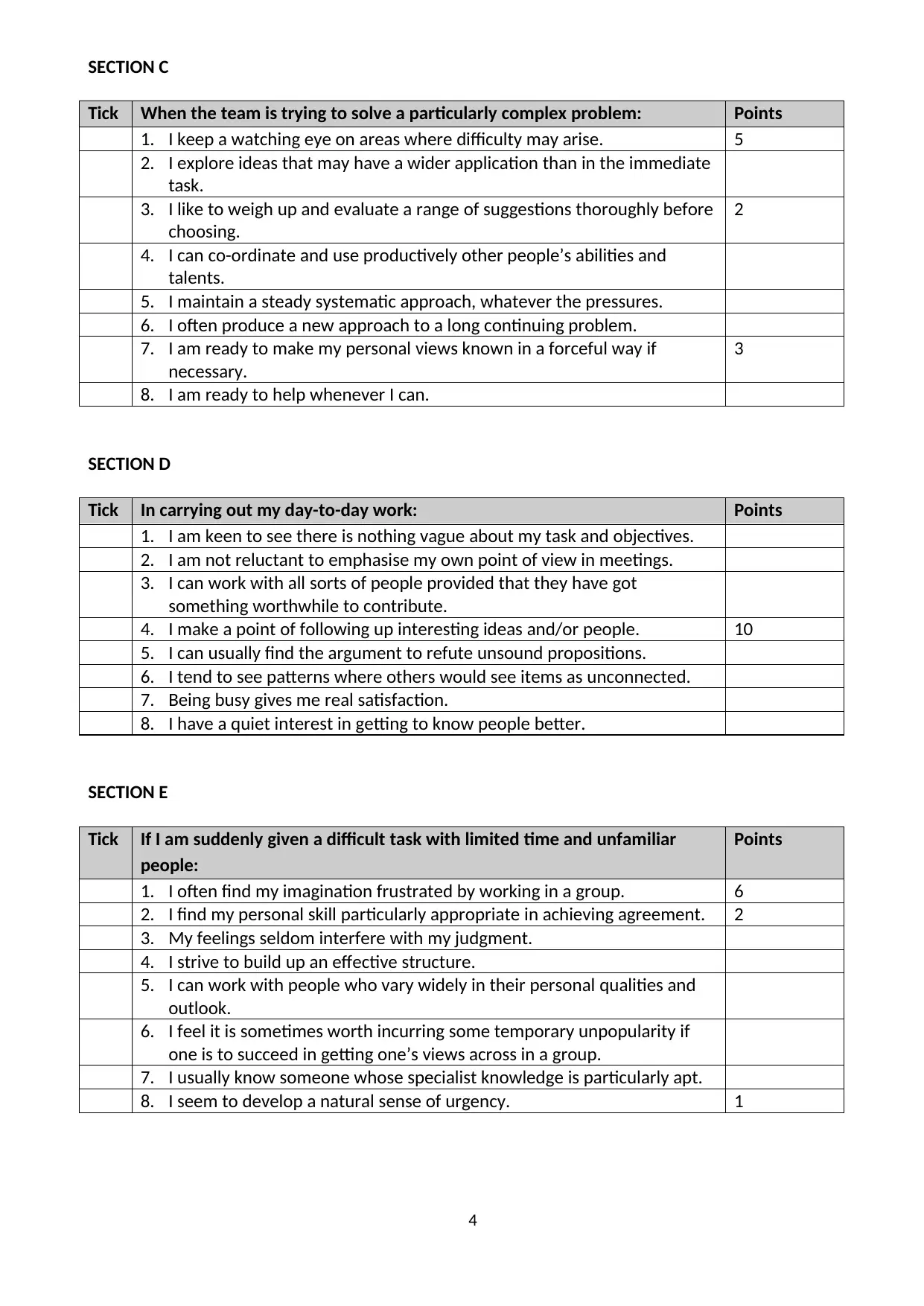
SECTION C
Tick When the team is trying to solve a particularly complex problem: Points
1. I keep a watching eye on areas where difficulty may arise. 5
2. I explore ideas that may have a wider application than in the immediate
task.
3. I like to weigh up and evaluate a range of suggestions thoroughly before
choosing.
2
4. I can co-ordinate and use productively other people’s abilities and
talents.
5. I maintain a steady systematic approach, whatever the pressures.
6. I often produce a new approach to a long continuing problem.
7. I am ready to make my personal views known in a forceful way if
necessary.
3
8. I am ready to help whenever I can.
SECTION D
Tick In carrying out my day-to-day work: Points
1. I am keen to see there is nothing vague about my task and objectives.
2. I am not reluctant to emphasise my own point of view in meetings.
3. I can work with all sorts of people provided that they have got
something worthwhile to contribute.
4. I make a point of following up interesting ideas and/or people. 10
5. I can usually find the argument to refute unsound propositions.
6. I tend to see patterns where others would see items as unconnected.
7. Being busy gives me real satisfaction.
8. I have a quiet interest in getting to know people better.
SECTION E
Tick If I am suddenly given a difficult task with limited time and unfamiliar
people:
Points
1. I often find my imagination frustrated by working in a group. 6
2. I find my personal skill particularly appropriate in achieving agreement. 2
3. My feelings seldom interfere with my judgment.
4. I strive to build up an effective structure.
5. I can work with people who vary widely in their personal qualities and
outlook.
6. I feel it is sometimes worth incurring some temporary unpopularity if
one is to succeed in getting one’s views across in a group.
7. I usually know someone whose specialist knowledge is particularly apt.
8. I seem to develop a natural sense of urgency. 1
4
Tick When the team is trying to solve a particularly complex problem: Points
1. I keep a watching eye on areas where difficulty may arise. 5
2. I explore ideas that may have a wider application than in the immediate
task.
3. I like to weigh up and evaluate a range of suggestions thoroughly before
choosing.
2
4. I can co-ordinate and use productively other people’s abilities and
talents.
5. I maintain a steady systematic approach, whatever the pressures.
6. I often produce a new approach to a long continuing problem.
7. I am ready to make my personal views known in a forceful way if
necessary.
3
8. I am ready to help whenever I can.
SECTION D
Tick In carrying out my day-to-day work: Points
1. I am keen to see there is nothing vague about my task and objectives.
2. I am not reluctant to emphasise my own point of view in meetings.
3. I can work with all sorts of people provided that they have got
something worthwhile to contribute.
4. I make a point of following up interesting ideas and/or people. 10
5. I can usually find the argument to refute unsound propositions.
6. I tend to see patterns where others would see items as unconnected.
7. Being busy gives me real satisfaction.
8. I have a quiet interest in getting to know people better.
SECTION E
Tick If I am suddenly given a difficult task with limited time and unfamiliar
people:
Points
1. I often find my imagination frustrated by working in a group. 6
2. I find my personal skill particularly appropriate in achieving agreement. 2
3. My feelings seldom interfere with my judgment.
4. I strive to build up an effective structure.
5. I can work with people who vary widely in their personal qualities and
outlook.
6. I feel it is sometimes worth incurring some temporary unpopularity if
one is to succeed in getting one’s views across in a group.
7. I usually know someone whose specialist knowledge is particularly apt.
8. I seem to develop a natural sense of urgency. 1
4
Secure Best Marks with AI Grader
Need help grading? Try our AI Grader for instant feedback on your assignments.
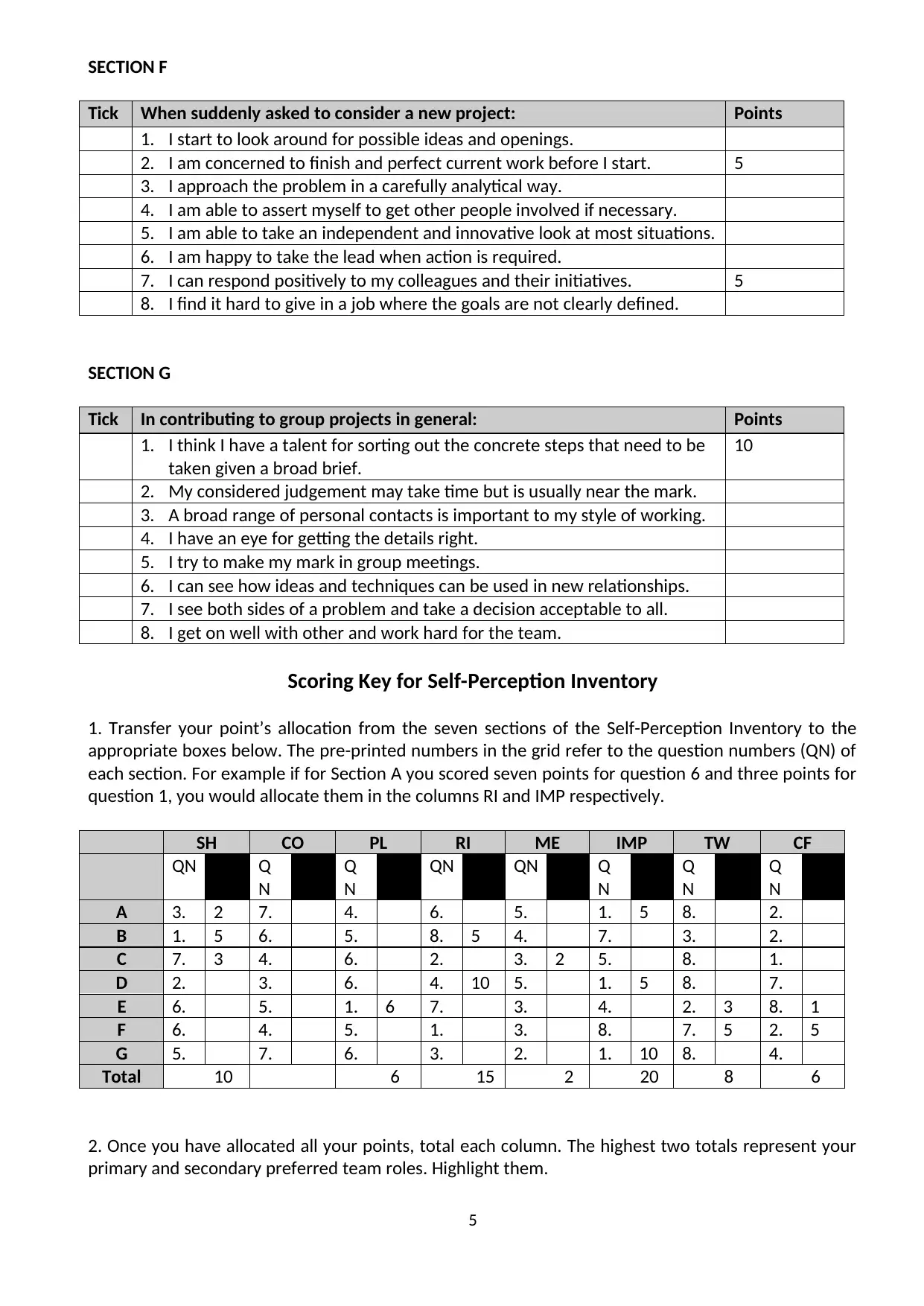
SECTION F
Tick When suddenly asked to consider a new project: Points
1. I start to look around for possible ideas and openings.
2. I am concerned to finish and perfect current work before I start. 5
3. I approach the problem in a carefully analytical way.
4. I am able to assert myself to get other people involved if necessary.
5. I am able to take an independent and innovative look at most situations.
6. I am happy to take the lead when action is required.
7. I can respond positively to my colleagues and their initiatives. 5
8. I find it hard to give in a job where the goals are not clearly defined.
SECTION G
Tick In contributing to group projects in general: Points
1. I think I have a talent for sorting out the concrete steps that need to be
taken given a broad brief.
10
2. My considered judgement may take time but is usually near the mark.
3. A broad range of personal contacts is important to my style of working.
4. I have an eye for getting the details right.
5. I try to make my mark in group meetings.
6. I can see how ideas and techniques can be used in new relationships.
7. I see both sides of a problem and take a decision acceptable to all.
8. I get on well with other and work hard for the team.
Scoring Key for Self-Perception Inventory
1. Transfer your point’s allocation from the seven sections of the Self-Perception Inventory to the
appropriate boxes below. The pre-printed numbers in the grid refer to the question numbers (QN) of
each section. For example if for Section A you scored seven points for question 6 and three points for
question 1, you would allocate them in the columns RI and IMP respectively.
SH CO PL RI ME IMP TW CF
QN Q
N
Q
N
QN QN Q
N
Q
N
Q
N
A 3. 2 7. 4. 6. 5. 1. 5 8. 2.
B 1. 5 6. 5. 8. 5 4. 7. 3. 2.
C 7. 3 4. 6. 2. 3. 2 5. 8. 1.
D 2. 3. 6. 4. 10 5. 1. 5 8. 7.
E 6. 5. 1. 6 7. 3. 4. 2. 3 8. 1
F 6. 4. 5. 1. 3. 8. 7. 5 2. 5
G 5. 7. 6. 3. 2. 1. 10 8. 4.
Total 10 6 15 2 20 8 6
2. Once you have allocated all your points, total each column. The highest two totals represent your
primary and secondary preferred team roles. Highlight them.
5
Tick When suddenly asked to consider a new project: Points
1. I start to look around for possible ideas and openings.
2. I am concerned to finish and perfect current work before I start. 5
3. I approach the problem in a carefully analytical way.
4. I am able to assert myself to get other people involved if necessary.
5. I am able to take an independent and innovative look at most situations.
6. I am happy to take the lead when action is required.
7. I can respond positively to my colleagues and their initiatives. 5
8. I find it hard to give in a job where the goals are not clearly defined.
SECTION G
Tick In contributing to group projects in general: Points
1. I think I have a talent for sorting out the concrete steps that need to be
taken given a broad brief.
10
2. My considered judgement may take time but is usually near the mark.
3. A broad range of personal contacts is important to my style of working.
4. I have an eye for getting the details right.
5. I try to make my mark in group meetings.
6. I can see how ideas and techniques can be used in new relationships.
7. I see both sides of a problem and take a decision acceptable to all.
8. I get on well with other and work hard for the team.
Scoring Key for Self-Perception Inventory
1. Transfer your point’s allocation from the seven sections of the Self-Perception Inventory to the
appropriate boxes below. The pre-printed numbers in the grid refer to the question numbers (QN) of
each section. For example if for Section A you scored seven points for question 6 and three points for
question 1, you would allocate them in the columns RI and IMP respectively.
SH CO PL RI ME IMP TW CF
QN Q
N
Q
N
QN QN Q
N
Q
N
Q
N
A 3. 2 7. 4. 6. 5. 1. 5 8. 2.
B 1. 5 6. 5. 8. 5 4. 7. 3. 2.
C 7. 3 4. 6. 2. 3. 2 5. 8. 1.
D 2. 3. 6. 4. 10 5. 1. 5 8. 7.
E 6. 5. 1. 6 7. 3. 4. 2. 3 8. 1
F 6. 4. 5. 1. 3. 8. 7. 5 2. 5
G 5. 7. 6. 3. 2. 1. 10 8. 4.
Total 10 6 15 2 20 8 6
2. Once you have allocated all your points, total each column. The highest two totals represent your
primary and secondary preferred team roles. Highlight them.
5
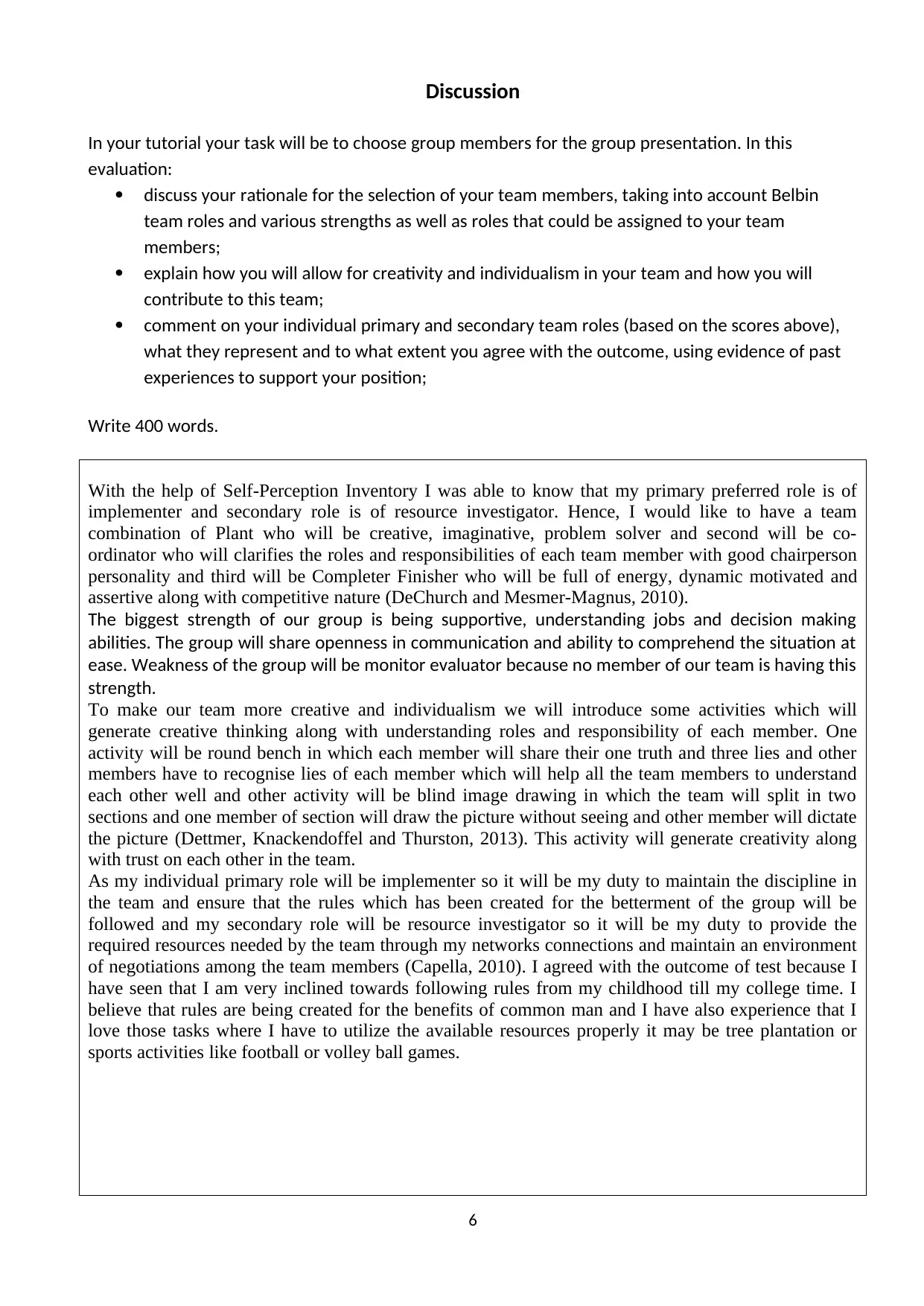
Discussion
In your tutorial your task will be to choose group members for the group presentation. In this
evaluation:
discuss your rationale for the selection of your team members, taking into account Belbin
team roles and various strengths as well as roles that could be assigned to your team
members;
explain how you will allow for creativity and individualism in your team and how you will
contribute to this team;
comment on your individual primary and secondary team roles (based on the scores above),
what they represent and to what extent you agree with the outcome, using evidence of past
experiences to support your position;
Write 400 words.
With the help of Self-Perception Inventory I was able to know that my primary preferred role is of
implementer and secondary role is of resource investigator. Hence, I would like to have a team
combination of Plant who will be creative, imaginative, problem solver and second will be co-
ordinator who will clarifies the roles and responsibilities of each team member with good chairperson
personality and third will be Completer Finisher who will be full of energy, dynamic motivated and
assertive along with competitive nature (DeChurch and Mesmer-Magnus, 2010).
The biggest strength of our group is being supportive, understanding jobs and decision making
abilities. The group will share openness in communication and ability to comprehend the situation at
ease. Weakness of the group will be monitor evaluator because no member of our team is having this
strength.
To make our team more creative and individualism we will introduce some activities which will
generate creative thinking along with understanding roles and responsibility of each member. One
activity will be round bench in which each member will share their one truth and three lies and other
members have to recognise lies of each member which will help all the team members to understand
each other well and other activity will be blind image drawing in which the team will split in two
sections and one member of section will draw the picture without seeing and other member will dictate
the picture (Dettmer, Knackendoffel and Thurston, 2013). This activity will generate creativity along
with trust on each other in the team.
As my individual primary role will be implementer so it will be my duty to maintain the discipline in
the team and ensure that the rules which has been created for the betterment of the group will be
followed and my secondary role will be resource investigator so it will be my duty to provide the
required resources needed by the team through my networks connections and maintain an environment
of negotiations among the team members (Capella, 2010). I agreed with the outcome of test because I
have seen that I am very inclined towards following rules from my childhood till my college time. I
believe that rules are being created for the benefits of common man and I have also experience that I
love those tasks where I have to utilize the available resources properly it may be tree plantation or
sports activities like football or volley ball games.
6
In your tutorial your task will be to choose group members for the group presentation. In this
evaluation:
discuss your rationale for the selection of your team members, taking into account Belbin
team roles and various strengths as well as roles that could be assigned to your team
members;
explain how you will allow for creativity and individualism in your team and how you will
contribute to this team;
comment on your individual primary and secondary team roles (based on the scores above),
what they represent and to what extent you agree with the outcome, using evidence of past
experiences to support your position;
Write 400 words.
With the help of Self-Perception Inventory I was able to know that my primary preferred role is of
implementer and secondary role is of resource investigator. Hence, I would like to have a team
combination of Plant who will be creative, imaginative, problem solver and second will be co-
ordinator who will clarifies the roles and responsibilities of each team member with good chairperson
personality and third will be Completer Finisher who will be full of energy, dynamic motivated and
assertive along with competitive nature (DeChurch and Mesmer-Magnus, 2010).
The biggest strength of our group is being supportive, understanding jobs and decision making
abilities. The group will share openness in communication and ability to comprehend the situation at
ease. Weakness of the group will be monitor evaluator because no member of our team is having this
strength.
To make our team more creative and individualism we will introduce some activities which will
generate creative thinking along with understanding roles and responsibility of each member. One
activity will be round bench in which each member will share their one truth and three lies and other
members have to recognise lies of each member which will help all the team members to understand
each other well and other activity will be blind image drawing in which the team will split in two
sections and one member of section will draw the picture without seeing and other member will dictate
the picture (Dettmer, Knackendoffel and Thurston, 2013). This activity will generate creativity along
with trust on each other in the team.
As my individual primary role will be implementer so it will be my duty to maintain the discipline in
the team and ensure that the rules which has been created for the betterment of the group will be
followed and my secondary role will be resource investigator so it will be my duty to provide the
required resources needed by the team through my networks connections and maintain an environment
of negotiations among the team members (Capella, 2010). I agreed with the outcome of test because I
have seen that I am very inclined towards following rules from my childhood till my college time. I
believe that rules are being created for the benefits of common man and I have also experience that I
love those tasks where I have to utilize the available resources properly it may be tree plantation or
sports activities like football or volley ball games.
6
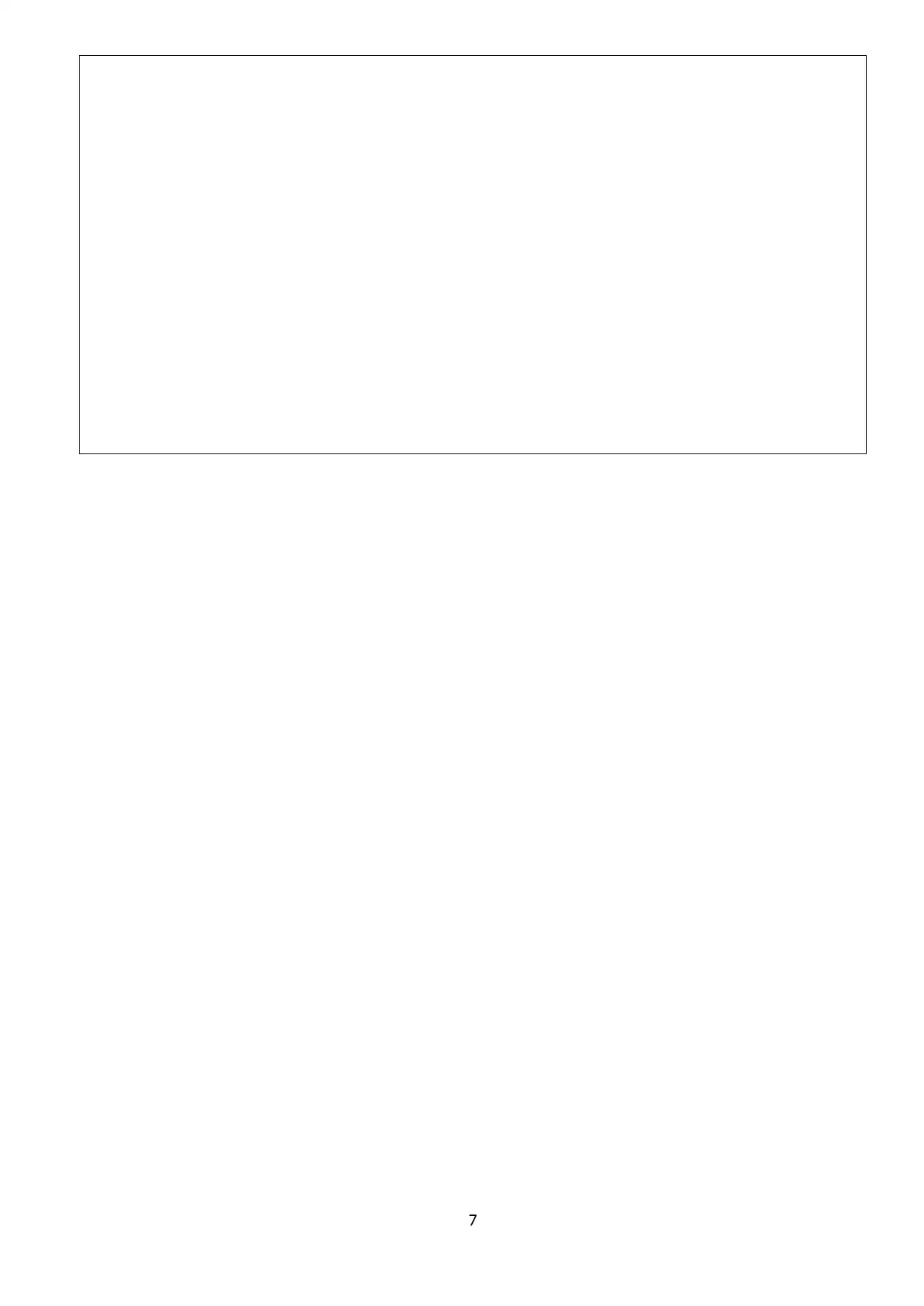
7
Paraphrase This Document
Need a fresh take? Get an instant paraphrase of this document with our AI Paraphraser
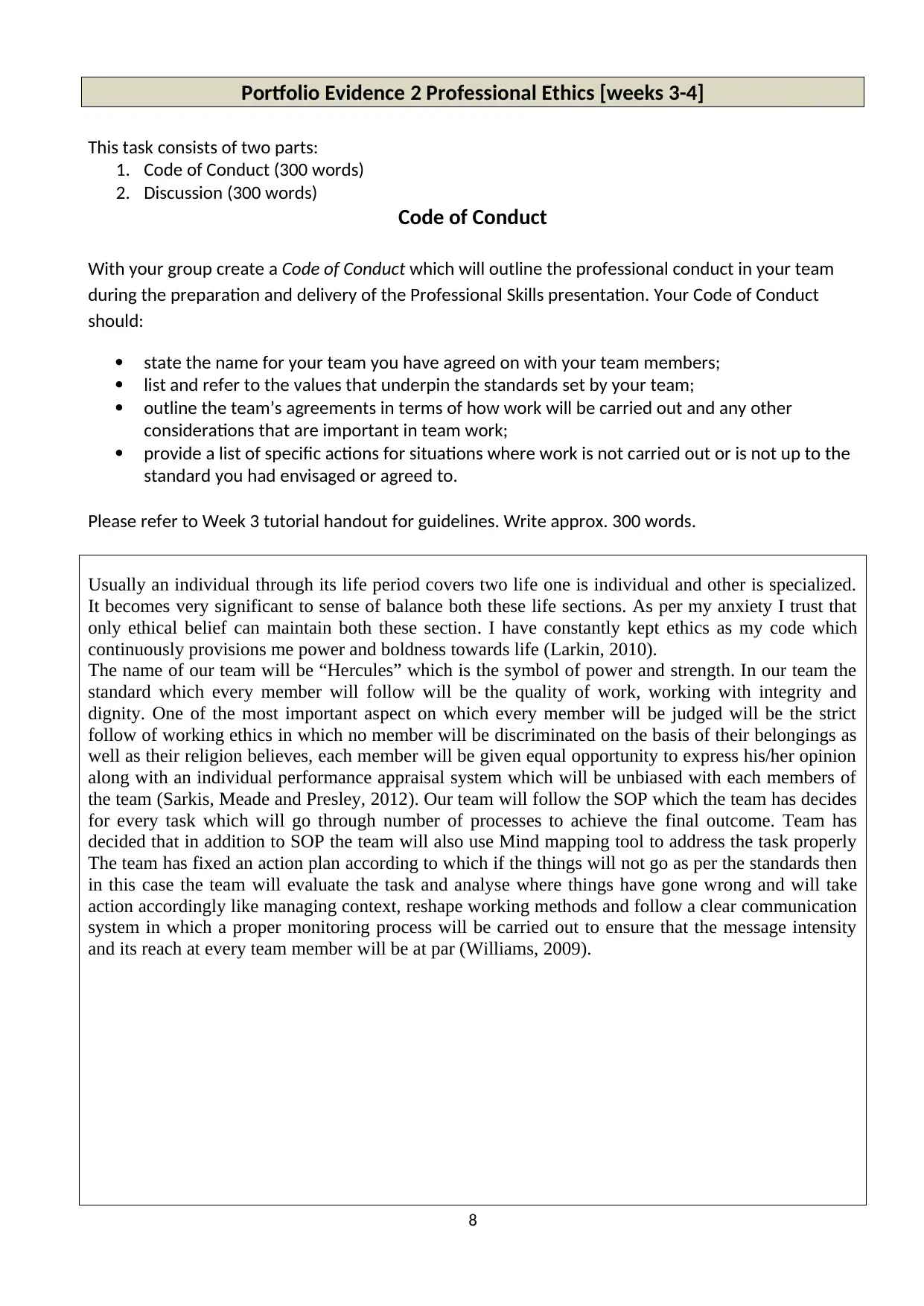
Portfolio Evidence 2 Professional Ethics [weeks 3-4]
This task consists of two parts:
1. Code of Conduct (300 words)
2. Discussion (300 words)
Code of Conduct
With your group create a Code of Conduct which will outline the professional conduct in your team
during the preparation and delivery of the Professional Skills presentation. Your Code of Conduct
should:
state the name for your team you have agreed on with your team members;
list and refer to the values that underpin the standards set by your team;
outline the team’s agreements in terms of how work will be carried out and any other
considerations that are important in team work;
provide a list of specific actions for situations where work is not carried out or is not up to the
standard you had envisaged or agreed to.
Please refer to Week 3 tutorial handout for guidelines. Write approx. 300 words.
Usually an individual through its life period covers two life one is individual and other is specialized.
It becomes very significant to sense of balance both these life sections. As per my anxiety I trust that
only ethical belief can maintain both these section. I have constantly kept ethics as my code which
continuously provisions me power and boldness towards life (Larkin, 2010).
The name of our team will be “Hercules” which is the symbol of power and strength. In our team the
standard which every member will follow will be the quality of work, working with integrity and
dignity. One of the most important aspect on which every member will be judged will be the strict
follow of working ethics in which no member will be discriminated on the basis of their belongings as
well as their religion believes, each member will be given equal opportunity to express his/her opinion
along with an individual performance appraisal system which will be unbiased with each members of
the team (Sarkis, Meade and Presley, 2012). Our team will follow the SOP which the team has decides
for every task which will go through number of processes to achieve the final outcome. Team has
decided that in addition to SOP the team will also use Mind mapping tool to address the task properly
The team has fixed an action plan according to which if the things will not go as per the standards then
in this case the team will evaluate the task and analyse where things have gone wrong and will take
action accordingly like managing context, reshape working methods and follow a clear communication
system in which a proper monitoring process will be carried out to ensure that the message intensity
and its reach at every team member will be at par (Williams, 2009).
8
This task consists of two parts:
1. Code of Conduct (300 words)
2. Discussion (300 words)
Code of Conduct
With your group create a Code of Conduct which will outline the professional conduct in your team
during the preparation and delivery of the Professional Skills presentation. Your Code of Conduct
should:
state the name for your team you have agreed on with your team members;
list and refer to the values that underpin the standards set by your team;
outline the team’s agreements in terms of how work will be carried out and any other
considerations that are important in team work;
provide a list of specific actions for situations where work is not carried out or is not up to the
standard you had envisaged or agreed to.
Please refer to Week 3 tutorial handout for guidelines. Write approx. 300 words.
Usually an individual through its life period covers two life one is individual and other is specialized.
It becomes very significant to sense of balance both these life sections. As per my anxiety I trust that
only ethical belief can maintain both these section. I have constantly kept ethics as my code which
continuously provisions me power and boldness towards life (Larkin, 2010).
The name of our team will be “Hercules” which is the symbol of power and strength. In our team the
standard which every member will follow will be the quality of work, working with integrity and
dignity. One of the most important aspect on which every member will be judged will be the strict
follow of working ethics in which no member will be discriminated on the basis of their belongings as
well as their religion believes, each member will be given equal opportunity to express his/her opinion
along with an individual performance appraisal system which will be unbiased with each members of
the team (Sarkis, Meade and Presley, 2012). Our team will follow the SOP which the team has decides
for every task which will go through number of processes to achieve the final outcome. Team has
decided that in addition to SOP the team will also use Mind mapping tool to address the task properly
The team has fixed an action plan according to which if the things will not go as per the standards then
in this case the team will evaluate the task and analyse where things have gone wrong and will take
action accordingly like managing context, reshape working methods and follow a clear communication
system in which a proper monitoring process will be carried out to ensure that the message intensity
and its reach at every team member will be at par (Williams, 2009).
8
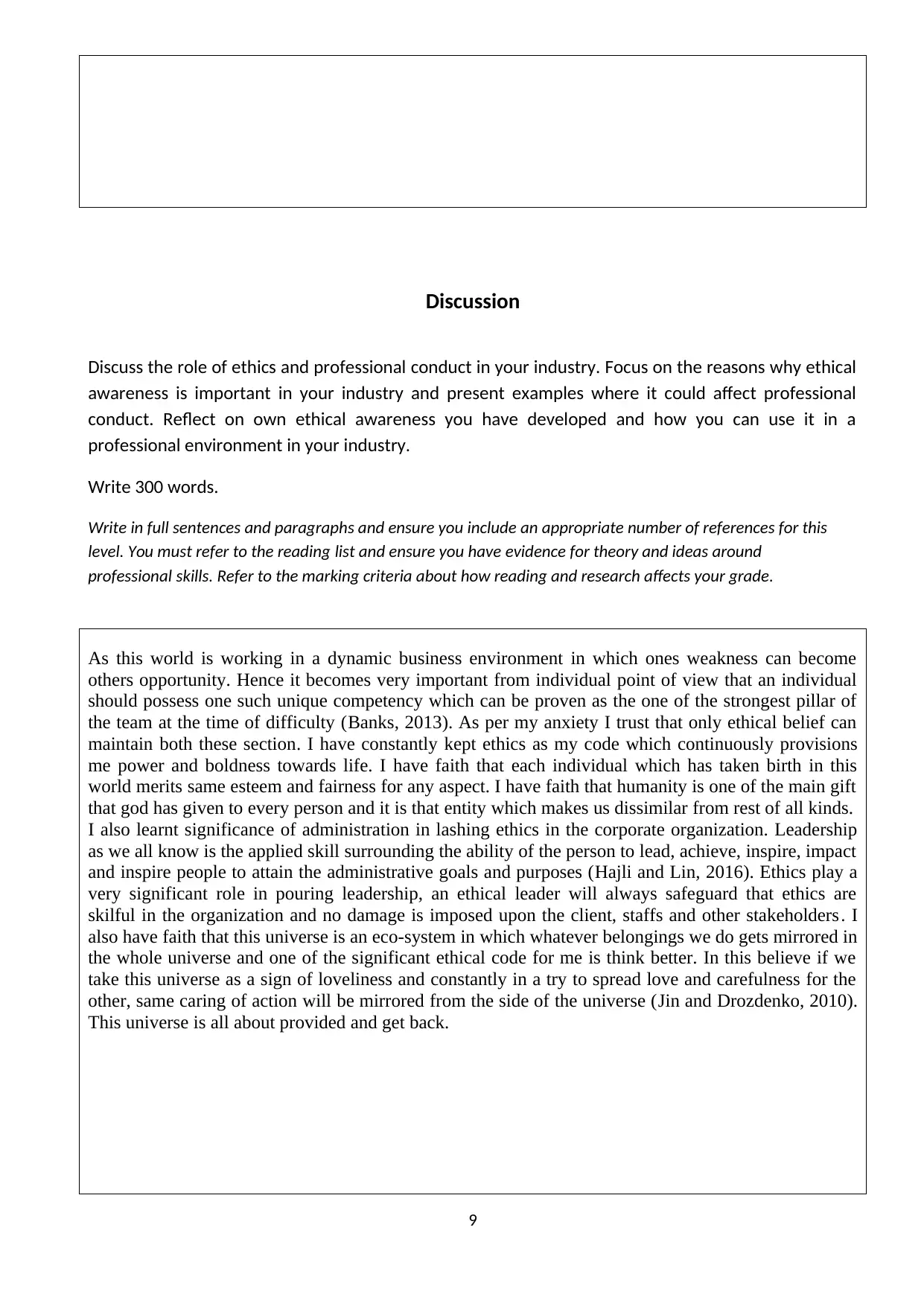
Discussion
Discuss the role of ethics and professional conduct in your industry. Focus on the reasons why ethical
awareness is important in your industry and present examples where it could affect professional
conduct. Reflect on own ethical awareness you have developed and how you can use it in a
professional environment in your industry.
Write 300 words.
Write in full sentences and paragraphs and ensure you include an appropriate number of references for this
level. You must refer to the reading list and ensure you have evidence for theory and ideas around
professional skills. Refer to the marking criteria about how reading and research affects your grade.
As this world is working in a dynamic business environment in which ones weakness can become
others opportunity. Hence it becomes very important from individual point of view that an individual
should possess one such unique competency which can be proven as the one of the strongest pillar of
the team at the time of difficulty (Banks, 2013). As per my anxiety I trust that only ethical belief can
maintain both these section. I have constantly kept ethics as my code which continuously provisions
me power and boldness towards life. I have faith that each individual which has taken birth in this
world merits same esteem and fairness for any aspect. I have faith that humanity is one of the main gift
that god has given to every person and it is that entity which makes us dissimilar from rest of all kinds.
I also learnt significance of administration in lashing ethics in the corporate organization. Leadership
as we all know is the applied skill surrounding the ability of the person to lead, achieve, inspire, impact
and inspire people to attain the administrative goals and purposes (Hajli and Lin, 2016). Ethics play a
very significant role in pouring leadership, an ethical leader will always safeguard that ethics are
skilful in the organization and no damage is imposed upon the client, staffs and other stakeholders. I
also have faith that this universe is an eco-system in which whatever belongings we do gets mirrored in
the whole universe and one of the significant ethical code for me is think better. In this believe if we
take this universe as a sign of loveliness and constantly in a try to spread love and carefulness for the
other, same caring of action will be mirrored from the side of the universe (Jin and Drozdenko, 2010).
This universe is all about provided and get back.
9
Discuss the role of ethics and professional conduct in your industry. Focus on the reasons why ethical
awareness is important in your industry and present examples where it could affect professional
conduct. Reflect on own ethical awareness you have developed and how you can use it in a
professional environment in your industry.
Write 300 words.
Write in full sentences and paragraphs and ensure you include an appropriate number of references for this
level. You must refer to the reading list and ensure you have evidence for theory and ideas around
professional skills. Refer to the marking criteria about how reading and research affects your grade.
As this world is working in a dynamic business environment in which ones weakness can become
others opportunity. Hence it becomes very important from individual point of view that an individual
should possess one such unique competency which can be proven as the one of the strongest pillar of
the team at the time of difficulty (Banks, 2013). As per my anxiety I trust that only ethical belief can
maintain both these section. I have constantly kept ethics as my code which continuously provisions
me power and boldness towards life. I have faith that each individual which has taken birth in this
world merits same esteem and fairness for any aspect. I have faith that humanity is one of the main gift
that god has given to every person and it is that entity which makes us dissimilar from rest of all kinds.
I also learnt significance of administration in lashing ethics in the corporate organization. Leadership
as we all know is the applied skill surrounding the ability of the person to lead, achieve, inspire, impact
and inspire people to attain the administrative goals and purposes (Hajli and Lin, 2016). Ethics play a
very significant role in pouring leadership, an ethical leader will always safeguard that ethics are
skilful in the organization and no damage is imposed upon the client, staffs and other stakeholders. I
also have faith that this universe is an eco-system in which whatever belongings we do gets mirrored in
the whole universe and one of the significant ethical code for me is think better. In this believe if we
take this universe as a sign of loveliness and constantly in a try to spread love and carefulness for the
other, same caring of action will be mirrored from the side of the universe (Jin and Drozdenko, 2010).
This universe is all about provided and get back.
9
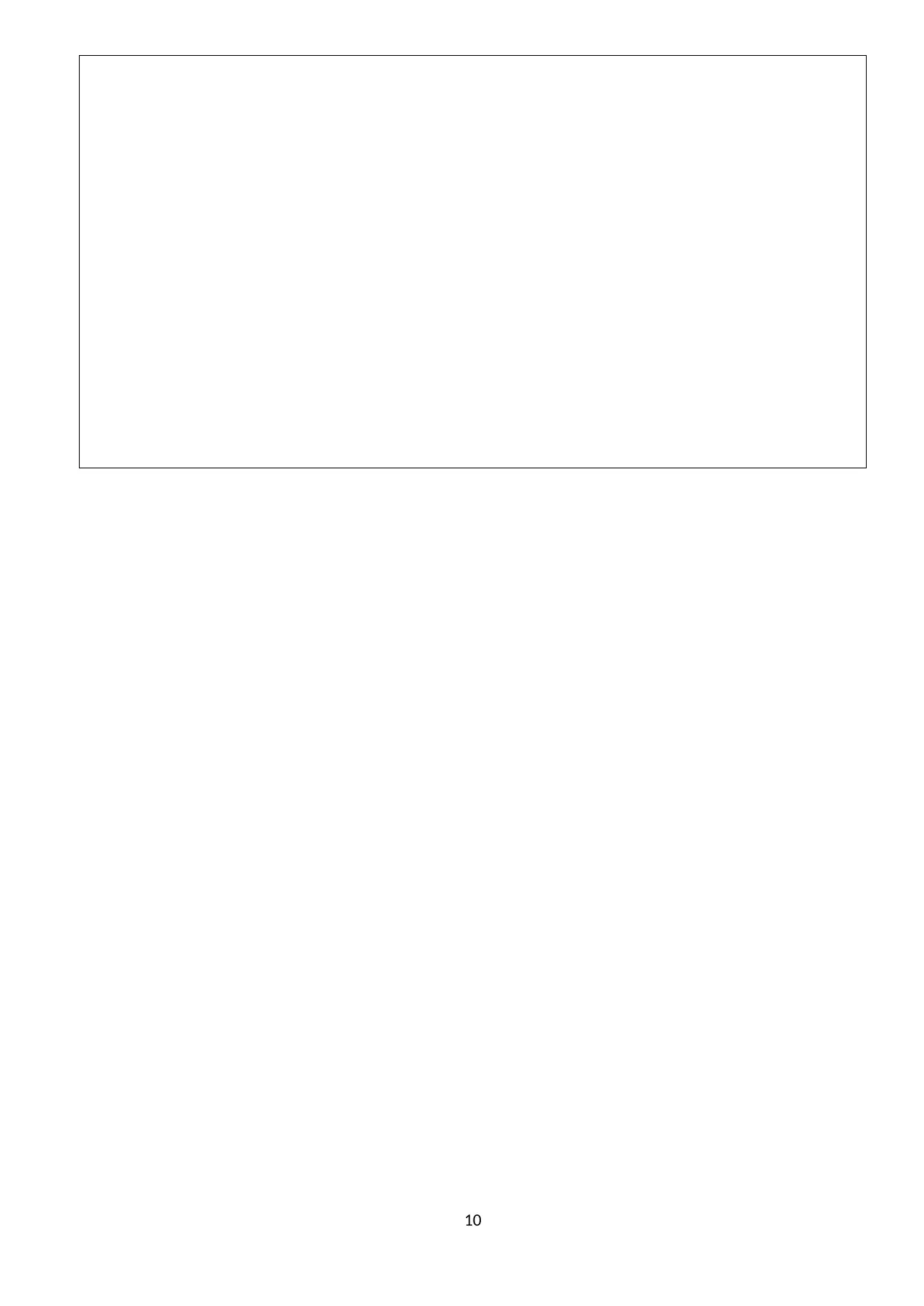
10
Secure Best Marks with AI Grader
Need help grading? Try our AI Grader for instant feedback on your assignments.
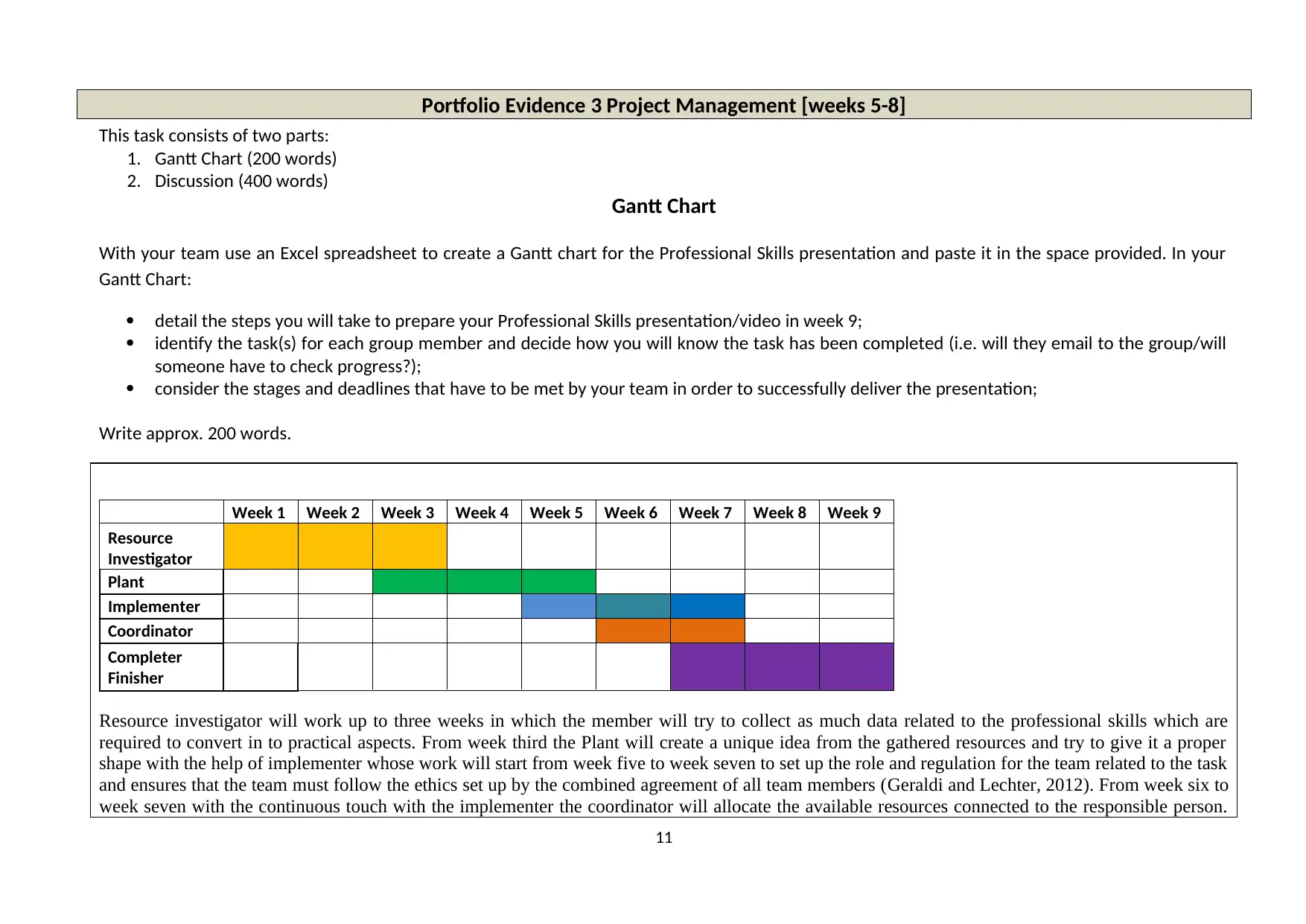
Portfolio Evidence 3 Project Management [weeks 5-8]
This task consists of two parts:
1. Gantt Chart (200 words)
2. Discussion (400 words)
Gantt Chart
With your team use an Excel spreadsheet to create a Gantt chart for the Professional Skills presentation and paste it in the space provided. In your
Gantt Chart:
detail the steps you will take to prepare your Professional Skills presentation/video in week 9;
identify the task(s) for each group member and decide how you will know the task has been completed (i.e. will they email to the group/will
someone have to check progress?);
consider the stages and deadlines that have to be met by your team in order to successfully deliver the presentation;
Write approx. 200 words.
Week 1 Week 2 Week 3 Week 4 Week 5 Week 6 Week 7 Week 8 Week 9
Resource
Investigator
Plant
Implementer
Coordinator
Completer
Finisher
Resource investigator will work up to three weeks in which the member will try to collect as much data related to the professional skills which are
required to convert in to practical aspects. From week third the Plant will create a unique idea from the gathered resources and try to give it a proper
shape with the help of implementer whose work will start from week five to week seven to set up the role and regulation for the team related to the task
and ensures that the team must follow the ethics set up by the combined agreement of all team members (Geraldi and Lechter, 2012). From week six to
week seven with the continuous touch with the implementer the coordinator will allocate the available resources connected to the responsible person.
11
This task consists of two parts:
1. Gantt Chart (200 words)
2. Discussion (400 words)
Gantt Chart
With your team use an Excel spreadsheet to create a Gantt chart for the Professional Skills presentation and paste it in the space provided. In your
Gantt Chart:
detail the steps you will take to prepare your Professional Skills presentation/video in week 9;
identify the task(s) for each group member and decide how you will know the task has been completed (i.e. will they email to the group/will
someone have to check progress?);
consider the stages and deadlines that have to be met by your team in order to successfully deliver the presentation;
Write approx. 200 words.
Week 1 Week 2 Week 3 Week 4 Week 5 Week 6 Week 7 Week 8 Week 9
Resource
Investigator
Plant
Implementer
Coordinator
Completer
Finisher
Resource investigator will work up to three weeks in which the member will try to collect as much data related to the professional skills which are
required to convert in to practical aspects. From week third the Plant will create a unique idea from the gathered resources and try to give it a proper
shape with the help of implementer whose work will start from week five to week seven to set up the role and regulation for the team related to the task
and ensures that the team must follow the ethics set up by the combined agreement of all team members (Geraldi and Lechter, 2012). From week six to
week seven with the continuous touch with the implementer the coordinator will allocate the available resources connected to the responsible person.
11
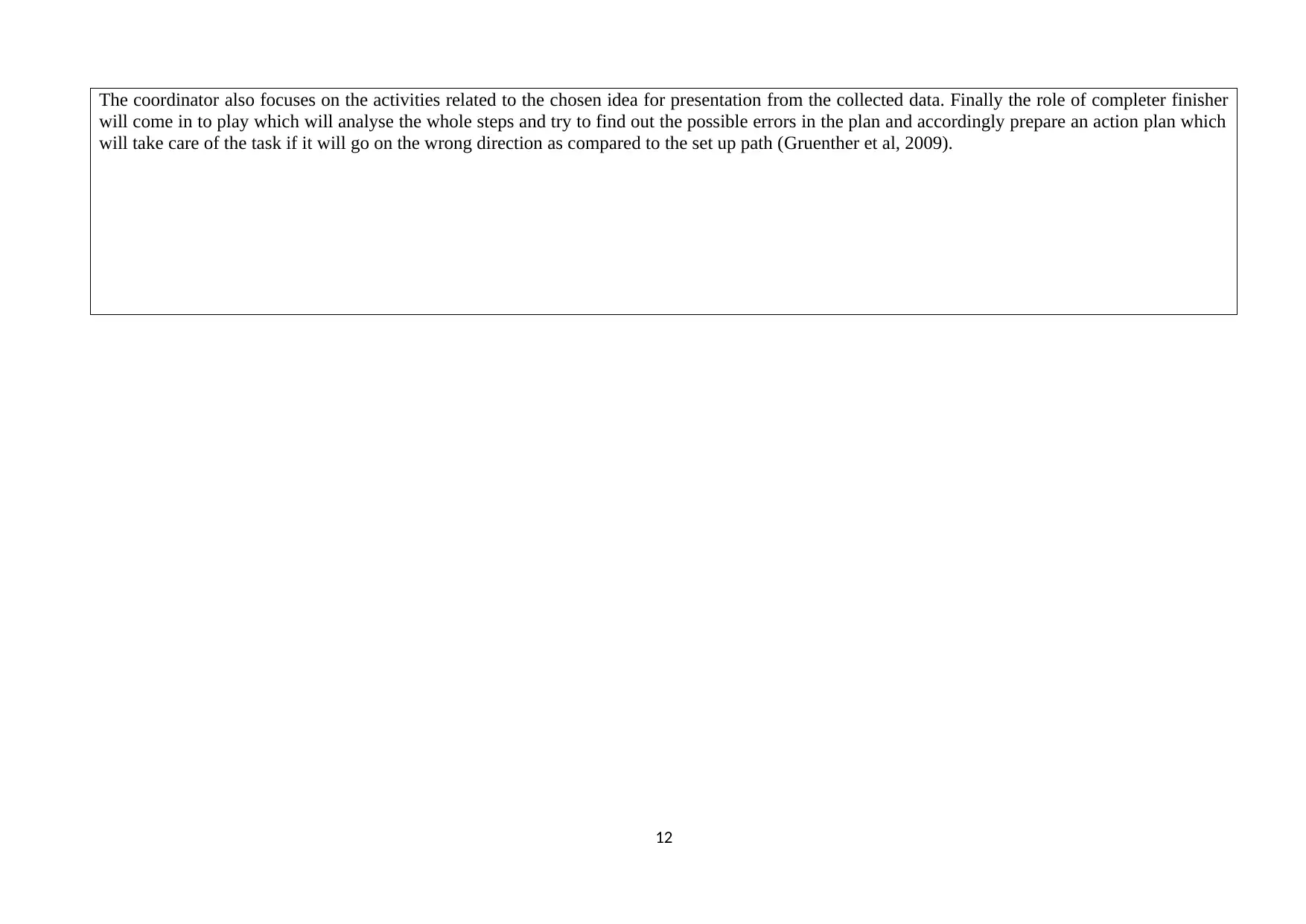
The coordinator also focuses on the activities related to the chosen idea for presentation from the collected data. Finally the role of completer finisher
will come in to play which will analyse the whole steps and try to find out the possible errors in the plan and accordingly prepare an action plan which
will take care of the task if it will go on the wrong direction as compared to the set up path (Gruenther et al, 2009).
12
will come in to play which will analyse the whole steps and try to find out the possible errors in the plan and accordingly prepare an action plan which
will take care of the task if it will go on the wrong direction as compared to the set up path (Gruenther et al, 2009).
12
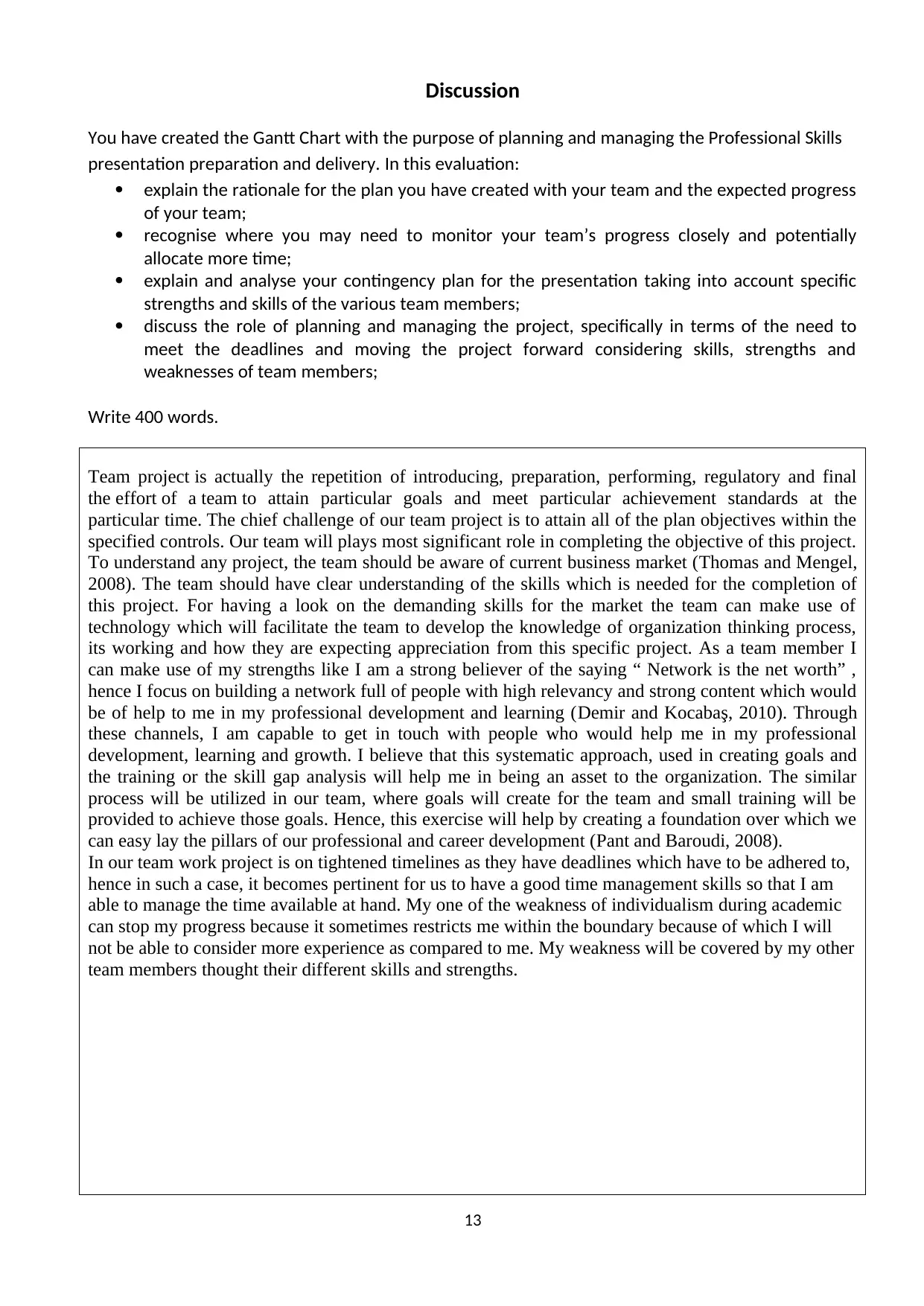
Discussion
You have created the Gantt Chart with the purpose of planning and managing the Professional Skills
presentation preparation and delivery. In this evaluation:
explain the rationale for the plan you have created with your team and the expected progress
of your team;
recognise where you may need to monitor your team’s progress closely and potentially
allocate more time;
explain and analyse your contingency plan for the presentation taking into account specific
strengths and skills of the various team members;
discuss the role of planning and managing the project, specifically in terms of the need to
meet the deadlines and moving the project forward considering skills, strengths and
weaknesses of team members;
Write 400 words.
Team project is actually the repetition of introducing, preparation, performing, regulatory and final
the effort of a team to attain particular goals and meet particular achievement standards at the
particular time. The chief challenge of our team project is to attain all of the plan objectives within the
specified controls. Our team will plays most significant role in completing the objective of this project.
To understand any project, the team should be aware of current business market (Thomas and Mengel,
2008). The team should have clear understanding of the skills which is needed for the completion of
this project. For having a look on the demanding skills for the market the team can make use of
technology which will facilitate the team to develop the knowledge of organization thinking process,
its working and how they are expecting appreciation from this specific project. As a team member I
can make use of my strengths like I am a strong believer of the saying “ Network is the net worth” ,
hence I focus on building a network full of people with high relevancy and strong content which would
be of help to me in my professional development and learning (Demir and Kocabaş, 2010). Through
these channels, I am capable to get in touch with people who would help me in my professional
development, learning and growth. I believe that this systematic approach, used in creating goals and
the training or the skill gap analysis will help me in being an asset to the organization. The similar
process will be utilized in our team, where goals will create for the team and small training will be
provided to achieve those goals. Hence, this exercise will help by creating a foundation over which we
can easy lay the pillars of our professional and career development (Pant and Baroudi, 2008).
In our team work project is on tightened timelines as they have deadlines which have to be adhered to,
hence in such a case, it becomes pertinent for us to have a good time management skills so that I am
able to manage the time available at hand. My one of the weakness of individualism during academic
can stop my progress because it sometimes restricts me within the boundary because of which I will
not be able to consider more experience as compared to me. My weakness will be covered by my other
team members thought their different skills and strengths.
13
You have created the Gantt Chart with the purpose of planning and managing the Professional Skills
presentation preparation and delivery. In this evaluation:
explain the rationale for the plan you have created with your team and the expected progress
of your team;
recognise where you may need to monitor your team’s progress closely and potentially
allocate more time;
explain and analyse your contingency plan for the presentation taking into account specific
strengths and skills of the various team members;
discuss the role of planning and managing the project, specifically in terms of the need to
meet the deadlines and moving the project forward considering skills, strengths and
weaknesses of team members;
Write 400 words.
Team project is actually the repetition of introducing, preparation, performing, regulatory and final
the effort of a team to attain particular goals and meet particular achievement standards at the
particular time. The chief challenge of our team project is to attain all of the plan objectives within the
specified controls. Our team will plays most significant role in completing the objective of this project.
To understand any project, the team should be aware of current business market (Thomas and Mengel,
2008). The team should have clear understanding of the skills which is needed for the completion of
this project. For having a look on the demanding skills for the market the team can make use of
technology which will facilitate the team to develop the knowledge of organization thinking process,
its working and how they are expecting appreciation from this specific project. As a team member I
can make use of my strengths like I am a strong believer of the saying “ Network is the net worth” ,
hence I focus on building a network full of people with high relevancy and strong content which would
be of help to me in my professional development and learning (Demir and Kocabaş, 2010). Through
these channels, I am capable to get in touch with people who would help me in my professional
development, learning and growth. I believe that this systematic approach, used in creating goals and
the training or the skill gap analysis will help me in being an asset to the organization. The similar
process will be utilized in our team, where goals will create for the team and small training will be
provided to achieve those goals. Hence, this exercise will help by creating a foundation over which we
can easy lay the pillars of our professional and career development (Pant and Baroudi, 2008).
In our team work project is on tightened timelines as they have deadlines which have to be adhered to,
hence in such a case, it becomes pertinent for us to have a good time management skills so that I am
able to manage the time available at hand. My one of the weakness of individualism during academic
can stop my progress because it sometimes restricts me within the boundary because of which I will
not be able to consider more experience as compared to me. My weakness will be covered by my other
team members thought their different skills and strengths.
13
Paraphrase This Document
Need a fresh take? Get an instant paraphrase of this document with our AI Paraphraser
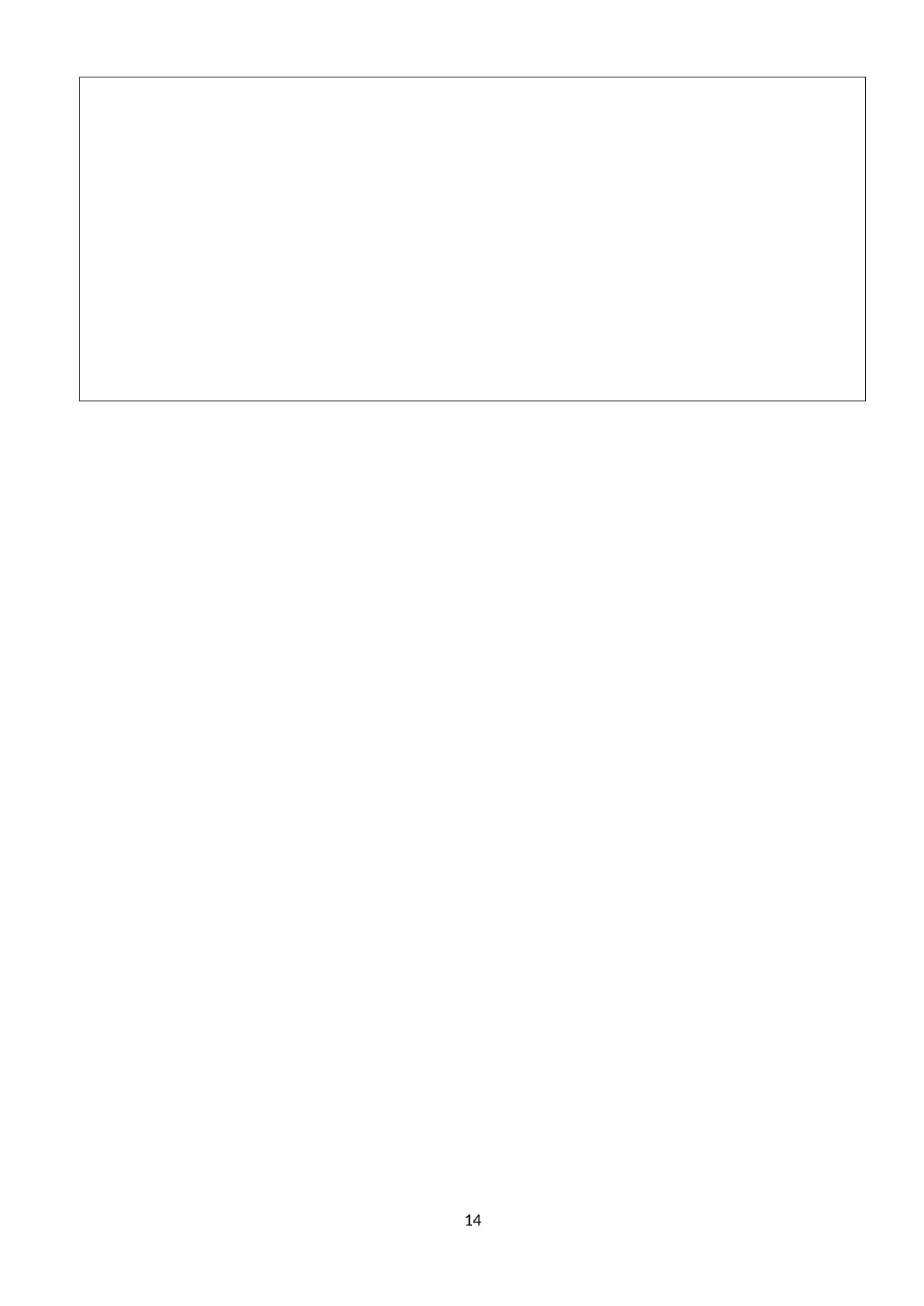
14
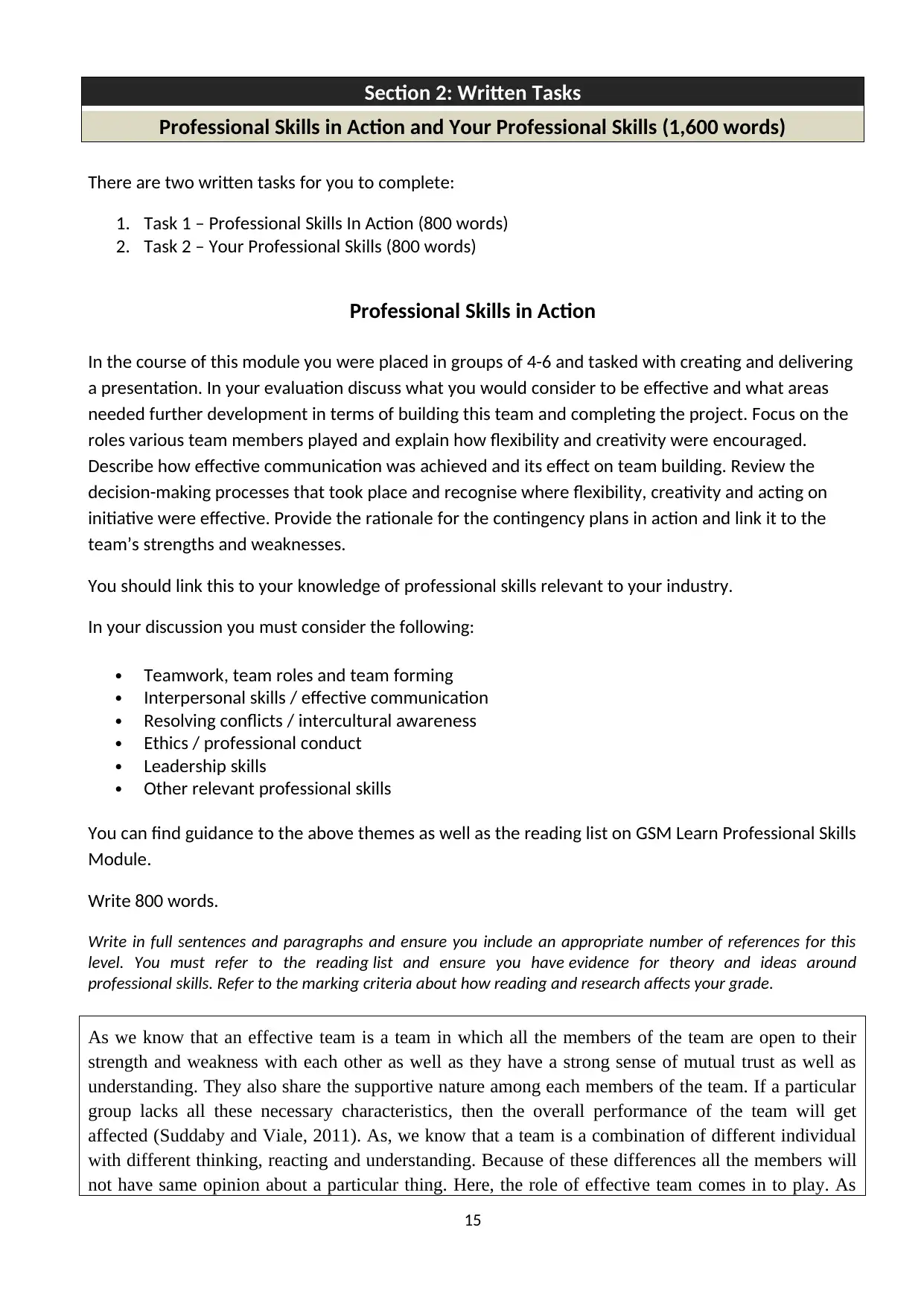
Section 2: Written Tasks
Professional Skills in Action and Your Professional Skills (1,600 words)
There are two written tasks for you to complete:
1. Task 1 – Professional Skills In Action (800 words)
2. Task 2 – Your Professional Skills (800 words)
Professional Skills in Action
In the course of this module you were placed in groups of 4-6 and tasked with creating and delivering
a presentation. In your evaluation discuss what you would consider to be effective and what areas
needed further development in terms of building this team and completing the project. Focus on the
roles various team members played and explain how flexibility and creativity were encouraged.
Describe how effective communication was achieved and its effect on team building. Review the
decision-making processes that took place and recognise where flexibility, creativity and acting on
initiative were effective. Provide the rationale for the contingency plans in action and link it to the
team’s strengths and weaknesses.
You should link this to your knowledge of professional skills relevant to your industry.
In your discussion you must consider the following:
Teamwork, team roles and team forming
Interpersonal skills / effective communication
Resolving conflicts / intercultural awareness
Ethics / professional conduct
Leadership skills
Other relevant professional skills
You can find guidance to the above themes as well as the reading list on GSM Learn Professional Skills
Module.
Write 800 words.
Write in full sentences and paragraphs and ensure you include an appropriate number of references for this
level. You must refer to the reading list and ensure you have evidence for theory and ideas around
professional skills. Refer to the marking criteria about how reading and research affects your grade.
As we know that an effective team is a team in which all the members of the team are open to their
strength and weakness with each other as well as they have a strong sense of mutual trust as well as
understanding. They also share the supportive nature among each members of the team. If a particular
group lacks all these necessary characteristics, then the overall performance of the team will get
affected (Suddaby and Viale, 2011). As, we know that a team is a combination of different individual
with different thinking, reacting and understanding. Because of these differences all the members will
not have same opinion about a particular thing. Here, the role of effective team comes in to play. As
15
Professional Skills in Action and Your Professional Skills (1,600 words)
There are two written tasks for you to complete:
1. Task 1 – Professional Skills In Action (800 words)
2. Task 2 – Your Professional Skills (800 words)
Professional Skills in Action
In the course of this module you were placed in groups of 4-6 and tasked with creating and delivering
a presentation. In your evaluation discuss what you would consider to be effective and what areas
needed further development in terms of building this team and completing the project. Focus on the
roles various team members played and explain how flexibility and creativity were encouraged.
Describe how effective communication was achieved and its effect on team building. Review the
decision-making processes that took place and recognise where flexibility, creativity and acting on
initiative were effective. Provide the rationale for the contingency plans in action and link it to the
team’s strengths and weaknesses.
You should link this to your knowledge of professional skills relevant to your industry.
In your discussion you must consider the following:
Teamwork, team roles and team forming
Interpersonal skills / effective communication
Resolving conflicts / intercultural awareness
Ethics / professional conduct
Leadership skills
Other relevant professional skills
You can find guidance to the above themes as well as the reading list on GSM Learn Professional Skills
Module.
Write 800 words.
Write in full sentences and paragraphs and ensure you include an appropriate number of references for this
level. You must refer to the reading list and ensure you have evidence for theory and ideas around
professional skills. Refer to the marking criteria about how reading and research affects your grade.
As we know that an effective team is a team in which all the members of the team are open to their
strength and weakness with each other as well as they have a strong sense of mutual trust as well as
understanding. They also share the supportive nature among each members of the team. If a particular
group lacks all these necessary characteristics, then the overall performance of the team will get
affected (Suddaby and Viale, 2011). As, we know that a team is a combination of different individual
with different thinking, reacting and understanding. Because of these differences all the members will
not have same opinion about a particular thing. Here, the role of effective team comes in to play. As
15
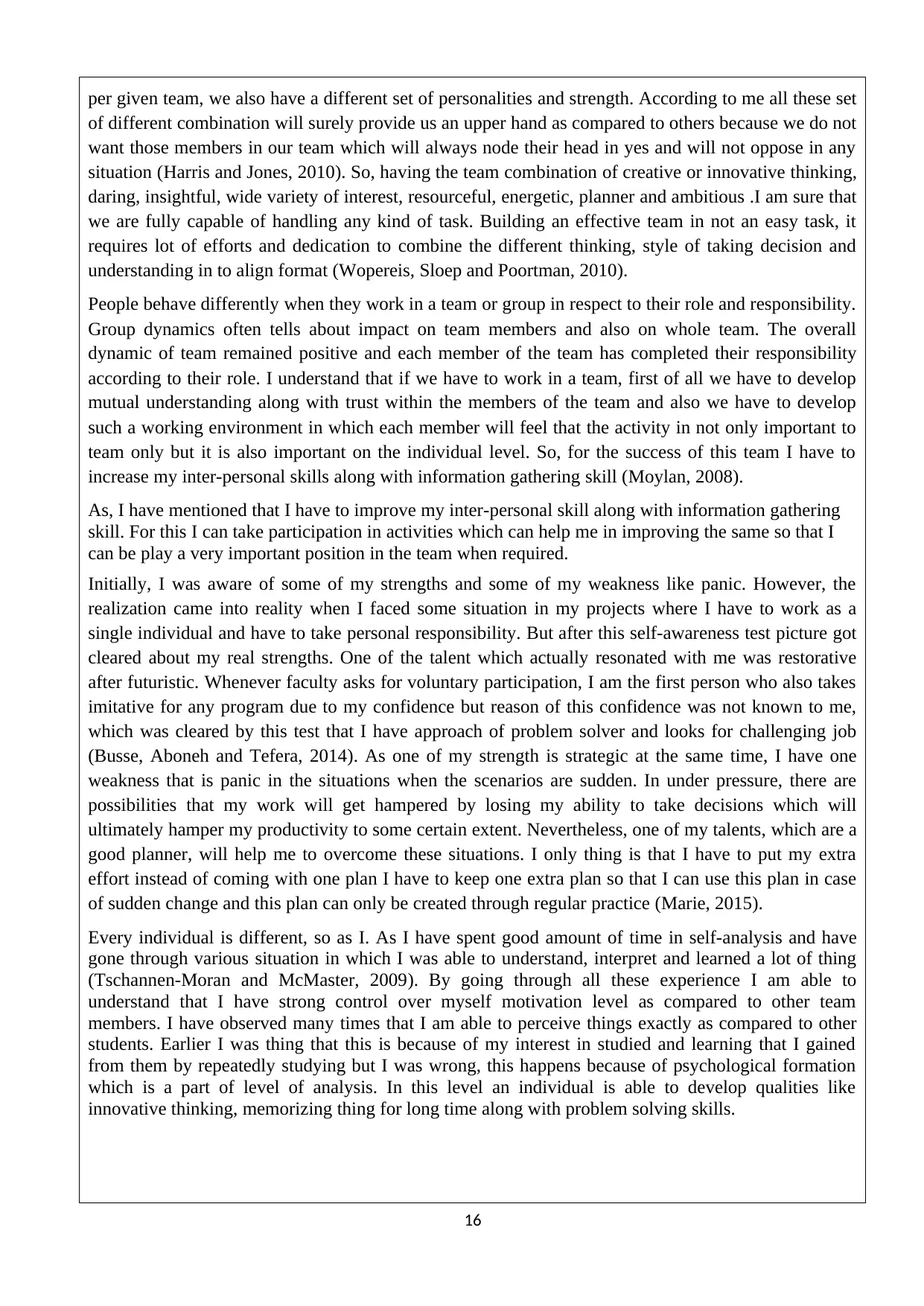
per given team, we also have a different set of personalities and strength. According to me all these set
of different combination will surely provide us an upper hand as compared to others because we do not
want those members in our team which will always node their head in yes and will not oppose in any
situation (Harris and Jones, 2010). So, having the team combination of creative or innovative thinking,
daring, insightful, wide variety of interest, resourceful, energetic, planner and ambitious .I am sure that
we are fully capable of handling any kind of task. Building an effective team in not an easy task, it
requires lot of efforts and dedication to combine the different thinking, style of taking decision and
understanding in to align format (Wopereis, Sloep and Poortman, 2010).
People behave differently when they work in a team or group in respect to their role and responsibility.
Group dynamics often tells about impact on team members and also on whole team. The overall
dynamic of team remained positive and each member of the team has completed their responsibility
according to their role. I understand that if we have to work in a team, first of all we have to develop
mutual understanding along with trust within the members of the team and also we have to develop
such a working environment in which each member will feel that the activity in not only important to
team only but it is also important on the individual level. So, for the success of this team I have to
increase my inter-personal skills along with information gathering skill (Moylan, 2008).
As, I have mentioned that I have to improve my inter-personal skill along with information gathering
skill. For this I can take participation in activities which can help me in improving the same so that I
can be play a very important position in the team when required.
Initially, I was aware of some of my strengths and some of my weakness like panic. However, the
realization came into reality when I faced some situation in my projects where I have to work as a
single individual and have to take personal responsibility. But after this self-awareness test picture got
cleared about my real strengths. One of the talent which actually resonated with me was restorative
after futuristic. Whenever faculty asks for voluntary participation, I am the first person who also takes
imitative for any program due to my confidence but reason of this confidence was not known to me,
which was cleared by this test that I have approach of problem solver and looks for challenging job
(Busse, Aboneh and Tefera, 2014). As one of my strength is strategic at the same time, I have one
weakness that is panic in the situations when the scenarios are sudden. In under pressure, there are
possibilities that my work will get hampered by losing my ability to take decisions which will
ultimately hamper my productivity to some certain extent. Nevertheless, one of my talents, which are a
good planner, will help me to overcome these situations. I only thing is that I have to put my extra
effort instead of coming with one plan I have to keep one extra plan so that I can use this plan in case
of sudden change and this plan can only be created through regular practice (Marie, 2015).
Every individual is different, so as I. As I have spent good amount of time in self-analysis and have
gone through various situation in which I was able to understand, interpret and learned a lot of thing
(Tschannen-Moran and McMaster, 2009). By going through all these experience I am able to
understand that I have strong control over myself motivation level as compared to other team
members. I have observed many times that I am able to perceive things exactly as compared to other
students. Earlier I was thing that this is because of my interest in studied and learning that I gained
from them by repeatedly studying but I was wrong, this happens because of psychological formation
which is a part of level of analysis. In this level an individual is able to develop qualities like
innovative thinking, memorizing thing for long time along with problem solving skills.
16
of different combination will surely provide us an upper hand as compared to others because we do not
want those members in our team which will always node their head in yes and will not oppose in any
situation (Harris and Jones, 2010). So, having the team combination of creative or innovative thinking,
daring, insightful, wide variety of interest, resourceful, energetic, planner and ambitious .I am sure that
we are fully capable of handling any kind of task. Building an effective team in not an easy task, it
requires lot of efforts and dedication to combine the different thinking, style of taking decision and
understanding in to align format (Wopereis, Sloep and Poortman, 2010).
People behave differently when they work in a team or group in respect to their role and responsibility.
Group dynamics often tells about impact on team members and also on whole team. The overall
dynamic of team remained positive and each member of the team has completed their responsibility
according to their role. I understand that if we have to work in a team, first of all we have to develop
mutual understanding along with trust within the members of the team and also we have to develop
such a working environment in which each member will feel that the activity in not only important to
team only but it is also important on the individual level. So, for the success of this team I have to
increase my inter-personal skills along with information gathering skill (Moylan, 2008).
As, I have mentioned that I have to improve my inter-personal skill along with information gathering
skill. For this I can take participation in activities which can help me in improving the same so that I
can be play a very important position in the team when required.
Initially, I was aware of some of my strengths and some of my weakness like panic. However, the
realization came into reality when I faced some situation in my projects where I have to work as a
single individual and have to take personal responsibility. But after this self-awareness test picture got
cleared about my real strengths. One of the talent which actually resonated with me was restorative
after futuristic. Whenever faculty asks for voluntary participation, I am the first person who also takes
imitative for any program due to my confidence but reason of this confidence was not known to me,
which was cleared by this test that I have approach of problem solver and looks for challenging job
(Busse, Aboneh and Tefera, 2014). As one of my strength is strategic at the same time, I have one
weakness that is panic in the situations when the scenarios are sudden. In under pressure, there are
possibilities that my work will get hampered by losing my ability to take decisions which will
ultimately hamper my productivity to some certain extent. Nevertheless, one of my talents, which are a
good planner, will help me to overcome these situations. I only thing is that I have to put my extra
effort instead of coming with one plan I have to keep one extra plan so that I can use this plan in case
of sudden change and this plan can only be created through regular practice (Marie, 2015).
Every individual is different, so as I. As I have spent good amount of time in self-analysis and have
gone through various situation in which I was able to understand, interpret and learned a lot of thing
(Tschannen-Moran and McMaster, 2009). By going through all these experience I am able to
understand that I have strong control over myself motivation level as compared to other team
members. I have observed many times that I am able to perceive things exactly as compared to other
students. Earlier I was thing that this is because of my interest in studied and learning that I gained
from them by repeatedly studying but I was wrong, this happens because of psychological formation
which is a part of level of analysis. In this level an individual is able to develop qualities like
innovative thinking, memorizing thing for long time along with problem solving skills.
16
Secure Best Marks with AI Grader
Need help grading? Try our AI Grader for instant feedback on your assignments.

17
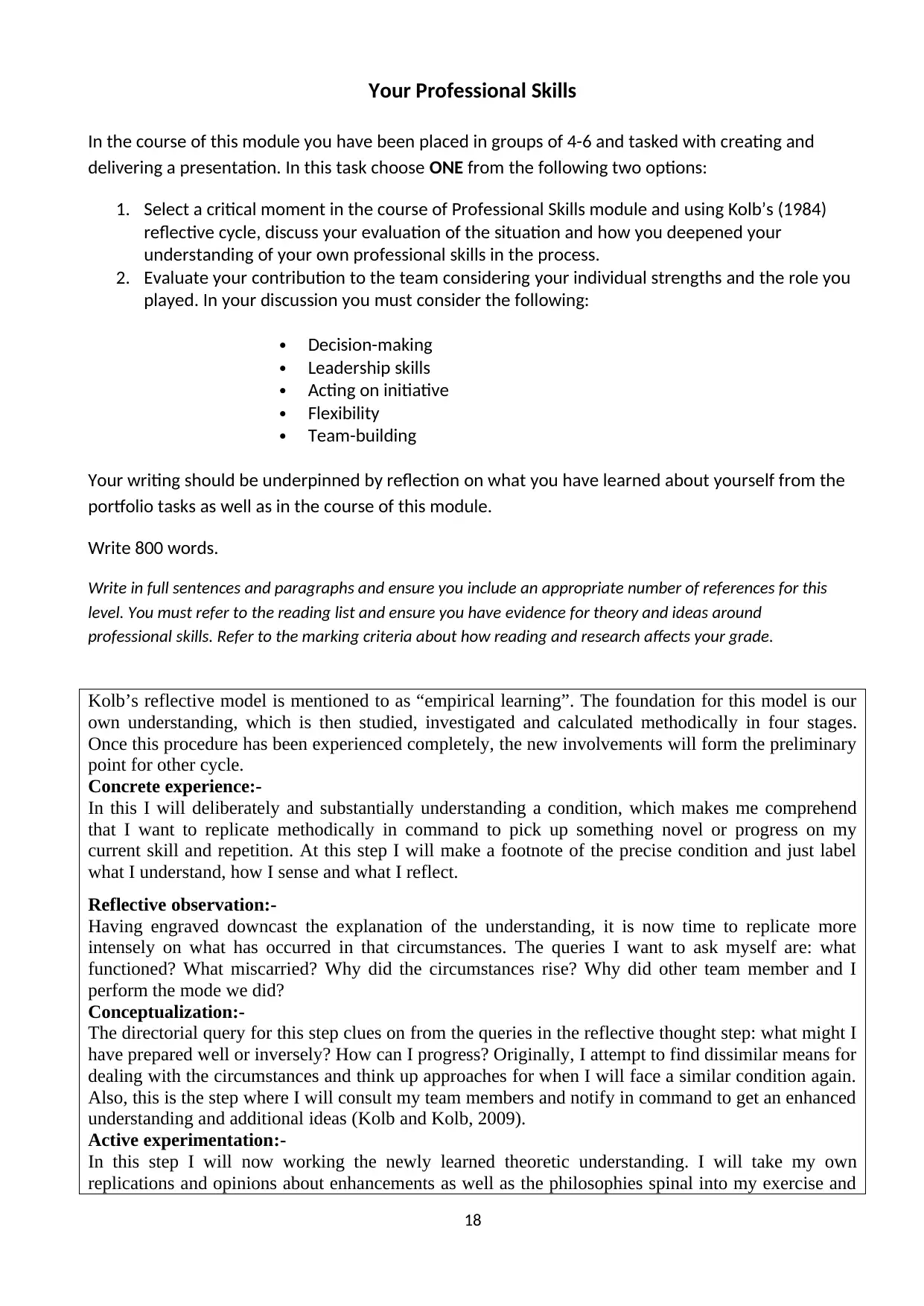
Your Professional Skills
In the course of this module you have been placed in groups of 4-6 and tasked with creating and
delivering a presentation. In this task choose ONE from the following two options:
1. Select a critical moment in the course of Professional Skills module and using Kolb’s (1984)
reflective cycle, discuss your evaluation of the situation and how you deepened your
understanding of your own professional skills in the process.
2. Evaluate your contribution to the team considering your individual strengths and the role you
played. In your discussion you must consider the following:
Decision-making
Leadership skills
Acting on initiative
Flexibility
Team-building
Your writing should be underpinned by reflection on what you have learned about yourself from the
portfolio tasks as well as in the course of this module.
Write 800 words.
Write in full sentences and paragraphs and ensure you include an appropriate number of references for this
level. You must refer to the reading list and ensure you have evidence for theory and ideas around
professional skills. Refer to the marking criteria about how reading and research affects your grade.
Kolb’s reflective model is mentioned to as “empirical learning”. The foundation for this model is our
own understanding, which is then studied, investigated and calculated methodically in four stages.
Once this procedure has been experienced completely, the new involvements will form the preliminary
point for other cycle.
Concrete experience:-
In this I will deliberately and substantially understanding a condition, which makes me comprehend
that I want to replicate methodically in command to pick up something novel or progress on my
current skill and repetition. At this step I will make a footnote of the precise condition and just label
what I understand, how I sense and what I reflect.
Reflective observation:-
Having engraved downcast the explanation of the understanding, it is now time to replicate more
intensely on what has occurred in that circumstances. The queries I want to ask myself are: what
functioned? What miscarried? Why did the circumstances rise? Why did other team member and I
perform the mode we did?
Conceptualization:-
The directorial query for this step clues on from the queries in the reflective thought step: what might I
have prepared well or inversely? How can I progress? Originally, I attempt to find dissimilar means for
dealing with the circumstances and think up approaches for when I will face a similar condition again.
Also, this is the step where I will consult my team members and notify in command to get an enhanced
understanding and additional ideas (Kolb and Kolb, 2009).
Active experimentation:-
In this step I will now working the newly learned theoretic understanding. I will take my own
replications and opinions about enhancements as well as the philosophies spinal into my exercise and
18
In the course of this module you have been placed in groups of 4-6 and tasked with creating and
delivering a presentation. In this task choose ONE from the following two options:
1. Select a critical moment in the course of Professional Skills module and using Kolb’s (1984)
reflective cycle, discuss your evaluation of the situation and how you deepened your
understanding of your own professional skills in the process.
2. Evaluate your contribution to the team considering your individual strengths and the role you
played. In your discussion you must consider the following:
Decision-making
Leadership skills
Acting on initiative
Flexibility
Team-building
Your writing should be underpinned by reflection on what you have learned about yourself from the
portfolio tasks as well as in the course of this module.
Write 800 words.
Write in full sentences and paragraphs and ensure you include an appropriate number of references for this
level. You must refer to the reading list and ensure you have evidence for theory and ideas around
professional skills. Refer to the marking criteria about how reading and research affects your grade.
Kolb’s reflective model is mentioned to as “empirical learning”. The foundation for this model is our
own understanding, which is then studied, investigated and calculated methodically in four stages.
Once this procedure has been experienced completely, the new involvements will form the preliminary
point for other cycle.
Concrete experience:-
In this I will deliberately and substantially understanding a condition, which makes me comprehend
that I want to replicate methodically in command to pick up something novel or progress on my
current skill and repetition. At this step I will make a footnote of the precise condition and just label
what I understand, how I sense and what I reflect.
Reflective observation:-
Having engraved downcast the explanation of the understanding, it is now time to replicate more
intensely on what has occurred in that circumstances. The queries I want to ask myself are: what
functioned? What miscarried? Why did the circumstances rise? Why did other team member and I
perform the mode we did?
Conceptualization:-
The directorial query for this step clues on from the queries in the reflective thought step: what might I
have prepared well or inversely? How can I progress? Originally, I attempt to find dissimilar means for
dealing with the circumstances and think up approaches for when I will face a similar condition again.
Also, this is the step where I will consult my team members and notify in command to get an enhanced
understanding and additional ideas (Kolb and Kolb, 2009).
Active experimentation:-
In this step I will now working the newly learned theoretic understanding. I will take my own
replications and opinions about enhancements as well as the philosophies spinal into my exercise and
18
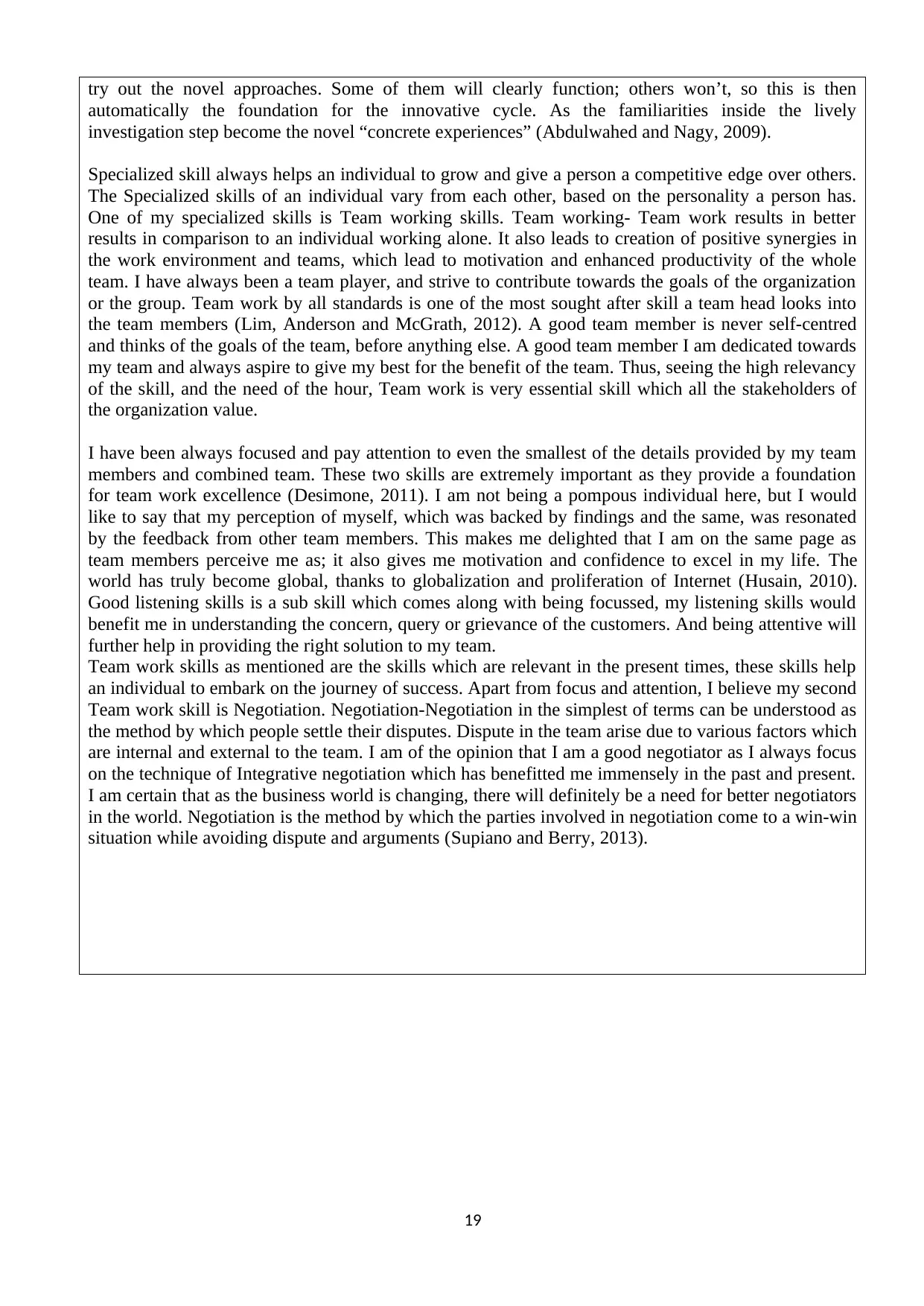
try out the novel approaches. Some of them will clearly function; others won’t, so this is then
automatically the foundation for the innovative cycle. As the familiarities inside the lively
investigation step become the novel “concrete experiences” (Abdulwahed and Nagy, 2009).
Specialized skill always helps an individual to grow and give a person a competitive edge over others.
The Specialized skills of an individual vary from each other, based on the personality a person has.
One of my specialized skills is Team working skills. Team working- Team work results in better
results in comparison to an individual working alone. It also leads to creation of positive synergies in
the work environment and teams, which lead to motivation and enhanced productivity of the whole
team. I have always been a team player, and strive to contribute towards the goals of the organization
or the group. Team work by all standards is one of the most sought after skill a team head looks into
the team members (Lim, Anderson and McGrath, 2012). A good team member is never self-centred
and thinks of the goals of the team, before anything else. A good team member I am dedicated towards
my team and always aspire to give my best for the benefit of the team. Thus, seeing the high relevancy
of the skill, and the need of the hour, Team work is very essential skill which all the stakeholders of
the organization value.
I have been always focused and pay attention to even the smallest of the details provided by my team
members and combined team. These two skills are extremely important as they provide a foundation
for team work excellence (Desimone, 2011). I am not being a pompous individual here, but I would
like to say that my perception of myself, which was backed by findings and the same, was resonated
by the feedback from other team members. This makes me delighted that I am on the same page as
team members perceive me as; it also gives me motivation and confidence to excel in my life. The
world has truly become global, thanks to globalization and proliferation of Internet (Husain, 2010).
Good listening skills is a sub skill which comes along with being focussed, my listening skills would
benefit me in understanding the concern, query or grievance of the customers. And being attentive will
further help in providing the right solution to my team.
Team work skills as mentioned are the skills which are relevant in the present times, these skills help
an individual to embark on the journey of success. Apart from focus and attention, I believe my second
Team work skill is Negotiation. Negotiation-Negotiation in the simplest of terms can be understood as
the method by which people settle their disputes. Dispute in the team arise due to various factors which
are internal and external to the team. I am of the opinion that I am a good negotiator as I always focus
on the technique of Integrative negotiation which has benefitted me immensely in the past and present.
I am certain that as the business world is changing, there will definitely be a need for better negotiators
in the world. Negotiation is the method by which the parties involved in negotiation come to a win-win
situation while avoiding dispute and arguments (Supiano and Berry, 2013).
19
automatically the foundation for the innovative cycle. As the familiarities inside the lively
investigation step become the novel “concrete experiences” (Abdulwahed and Nagy, 2009).
Specialized skill always helps an individual to grow and give a person a competitive edge over others.
The Specialized skills of an individual vary from each other, based on the personality a person has.
One of my specialized skills is Team working skills. Team working- Team work results in better
results in comparison to an individual working alone. It also leads to creation of positive synergies in
the work environment and teams, which lead to motivation and enhanced productivity of the whole
team. I have always been a team player, and strive to contribute towards the goals of the organization
or the group. Team work by all standards is one of the most sought after skill a team head looks into
the team members (Lim, Anderson and McGrath, 2012). A good team member is never self-centred
and thinks of the goals of the team, before anything else. A good team member I am dedicated towards
my team and always aspire to give my best for the benefit of the team. Thus, seeing the high relevancy
of the skill, and the need of the hour, Team work is very essential skill which all the stakeholders of
the organization value.
I have been always focused and pay attention to even the smallest of the details provided by my team
members and combined team. These two skills are extremely important as they provide a foundation
for team work excellence (Desimone, 2011). I am not being a pompous individual here, but I would
like to say that my perception of myself, which was backed by findings and the same, was resonated
by the feedback from other team members. This makes me delighted that I am on the same page as
team members perceive me as; it also gives me motivation and confidence to excel in my life. The
world has truly become global, thanks to globalization and proliferation of Internet (Husain, 2010).
Good listening skills is a sub skill which comes along with being focussed, my listening skills would
benefit me in understanding the concern, query or grievance of the customers. And being attentive will
further help in providing the right solution to my team.
Team work skills as mentioned are the skills which are relevant in the present times, these skills help
an individual to embark on the journey of success. Apart from focus and attention, I believe my second
Team work skill is Negotiation. Negotiation-Negotiation in the simplest of terms can be understood as
the method by which people settle their disputes. Dispute in the team arise due to various factors which
are internal and external to the team. I am of the opinion that I am a good negotiator as I always focus
on the technique of Integrative negotiation which has benefitted me immensely in the past and present.
I am certain that as the business world is changing, there will definitely be a need for better negotiators
in the world. Negotiation is the method by which the parties involved in negotiation come to a win-win
situation while avoiding dispute and arguments (Supiano and Berry, 2013).
19
Paraphrase This Document
Need a fresh take? Get an instant paraphrase of this document with our AI Paraphraser
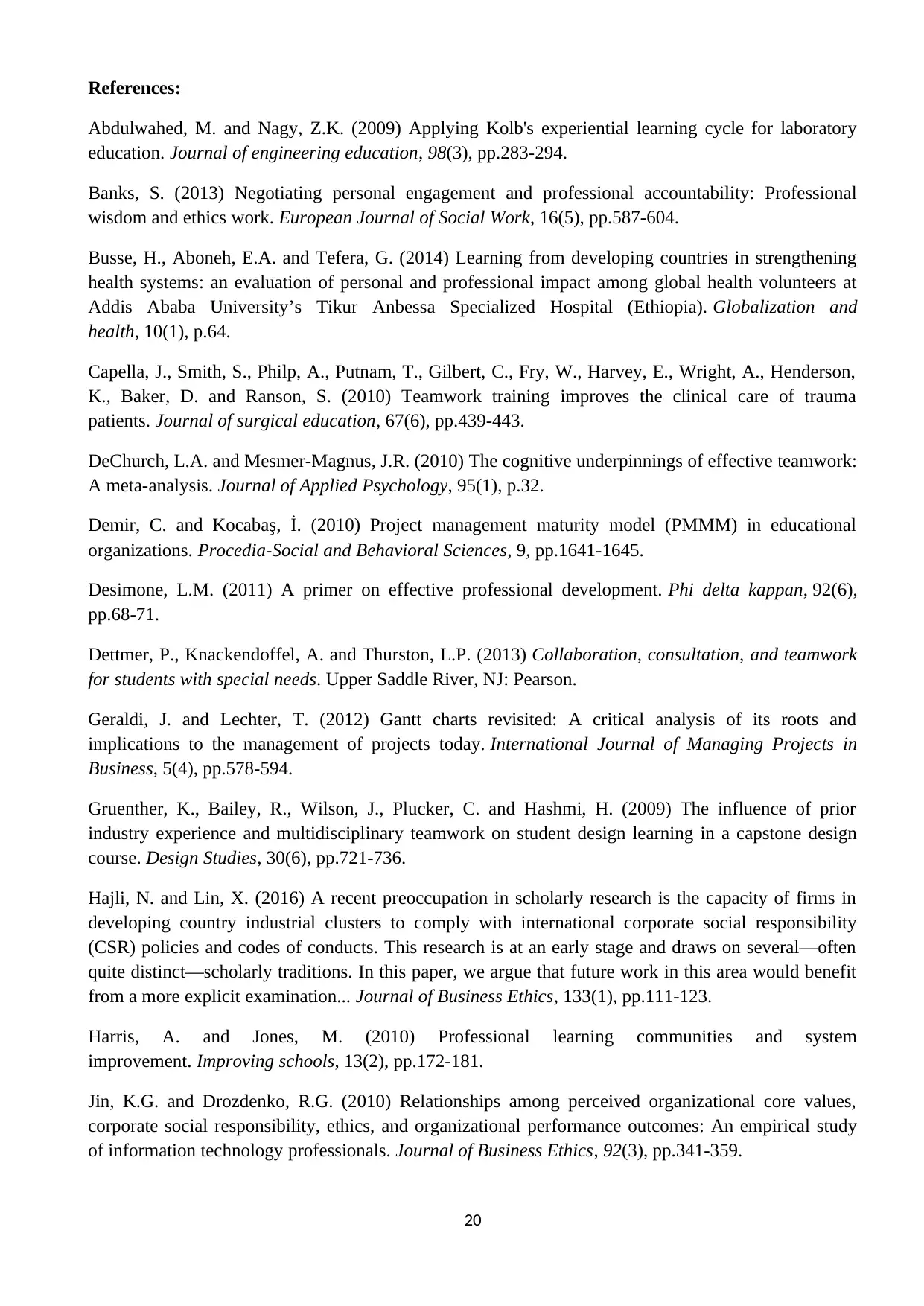
References:
Abdulwahed, M. and Nagy, Z.K. (2009) Applying Kolb's experiential learning cycle for laboratory
education. Journal of engineering education, 98(3), pp.283-294.
Banks, S. (2013) Negotiating personal engagement and professional accountability: Professional
wisdom and ethics work. European Journal of Social Work, 16(5), pp.587-604.
Busse, H., Aboneh, E.A. and Tefera, G. (2014) Learning from developing countries in strengthening
health systems: an evaluation of personal and professional impact among global health volunteers at
Addis Ababa University’s Tikur Anbessa Specialized Hospital (Ethiopia). Globalization and
health, 10(1), p.64.
Capella, J., Smith, S., Philp, A., Putnam, T., Gilbert, C., Fry, W., Harvey, E., Wright, A., Henderson,
K., Baker, D. and Ranson, S. (2010) Teamwork training improves the clinical care of trauma
patients. Journal of surgical education, 67(6), pp.439-443.
DeChurch, L.A. and Mesmer-Magnus, J.R. (2010) The cognitive underpinnings of effective teamwork:
A meta-analysis. Journal of Applied Psychology, 95(1), p.32.
Demir, C. and Kocabaş, İ. (2010) Project management maturity model (PMMM) in educational
organizations. Procedia-Social and Behavioral Sciences, 9, pp.1641-1645.
Desimone, L.M. (2011) A primer on effective professional development. Phi delta kappan, 92(6),
pp.68-71.
Dettmer, P., Knackendoffel, A. and Thurston, L.P. (2013) Collaboration, consultation, and teamwork
for students with special needs. Upper Saddle River, NJ: Pearson.
Geraldi, J. and Lechter, T. (2012) Gantt charts revisited: A critical analysis of its roots and
implications to the management of projects today. International Journal of Managing Projects in
Business, 5(4), pp.578-594.
Gruenther, K., Bailey, R., Wilson, J., Plucker, C. and Hashmi, H. (2009) The influence of prior
industry experience and multidisciplinary teamwork on student design learning in a capstone design
course. Design Studies, 30(6), pp.721-736.
Hajli, N. and Lin, X. (2016) A recent preoccupation in scholarly research is the capacity of firms in
developing country industrial clusters to comply with international corporate social responsibility
(CSR) policies and codes of conducts. This research is at an early stage and draws on several—often
quite distinct—scholarly traditions. In this paper, we argue that future work in this area would benefit
from a more explicit examination... Journal of Business Ethics, 133(1), pp.111-123.
Harris, A. and Jones, M. (2010) Professional learning communities and system
improvement. Improving schools, 13(2), pp.172-181.
Jin, K.G. and Drozdenko, R.G. (2010) Relationships among perceived organizational core values,
corporate social responsibility, ethics, and organizational performance outcomes: An empirical study
of information technology professionals. Journal of Business Ethics, 92(3), pp.341-359.
20
Abdulwahed, M. and Nagy, Z.K. (2009) Applying Kolb's experiential learning cycle for laboratory
education. Journal of engineering education, 98(3), pp.283-294.
Banks, S. (2013) Negotiating personal engagement and professional accountability: Professional
wisdom and ethics work. European Journal of Social Work, 16(5), pp.587-604.
Busse, H., Aboneh, E.A. and Tefera, G. (2014) Learning from developing countries in strengthening
health systems: an evaluation of personal and professional impact among global health volunteers at
Addis Ababa University’s Tikur Anbessa Specialized Hospital (Ethiopia). Globalization and
health, 10(1), p.64.
Capella, J., Smith, S., Philp, A., Putnam, T., Gilbert, C., Fry, W., Harvey, E., Wright, A., Henderson,
K., Baker, D. and Ranson, S. (2010) Teamwork training improves the clinical care of trauma
patients. Journal of surgical education, 67(6), pp.439-443.
DeChurch, L.A. and Mesmer-Magnus, J.R. (2010) The cognitive underpinnings of effective teamwork:
A meta-analysis. Journal of Applied Psychology, 95(1), p.32.
Demir, C. and Kocabaş, İ. (2010) Project management maturity model (PMMM) in educational
organizations. Procedia-Social and Behavioral Sciences, 9, pp.1641-1645.
Desimone, L.M. (2011) A primer on effective professional development. Phi delta kappan, 92(6),
pp.68-71.
Dettmer, P., Knackendoffel, A. and Thurston, L.P. (2013) Collaboration, consultation, and teamwork
for students with special needs. Upper Saddle River, NJ: Pearson.
Geraldi, J. and Lechter, T. (2012) Gantt charts revisited: A critical analysis of its roots and
implications to the management of projects today. International Journal of Managing Projects in
Business, 5(4), pp.578-594.
Gruenther, K., Bailey, R., Wilson, J., Plucker, C. and Hashmi, H. (2009) The influence of prior
industry experience and multidisciplinary teamwork on student design learning in a capstone design
course. Design Studies, 30(6), pp.721-736.
Hajli, N. and Lin, X. (2016) A recent preoccupation in scholarly research is the capacity of firms in
developing country industrial clusters to comply with international corporate social responsibility
(CSR) policies and codes of conducts. This research is at an early stage and draws on several—often
quite distinct—scholarly traditions. In this paper, we argue that future work in this area would benefit
from a more explicit examination... Journal of Business Ethics, 133(1), pp.111-123.
Harris, A. and Jones, M. (2010) Professional learning communities and system
improvement. Improving schools, 13(2), pp.172-181.
Jin, K.G. and Drozdenko, R.G. (2010) Relationships among perceived organizational core values,
corporate social responsibility, ethics, and organizational performance outcomes: An empirical study
of information technology professionals. Journal of Business Ethics, 92(3), pp.341-359.
20
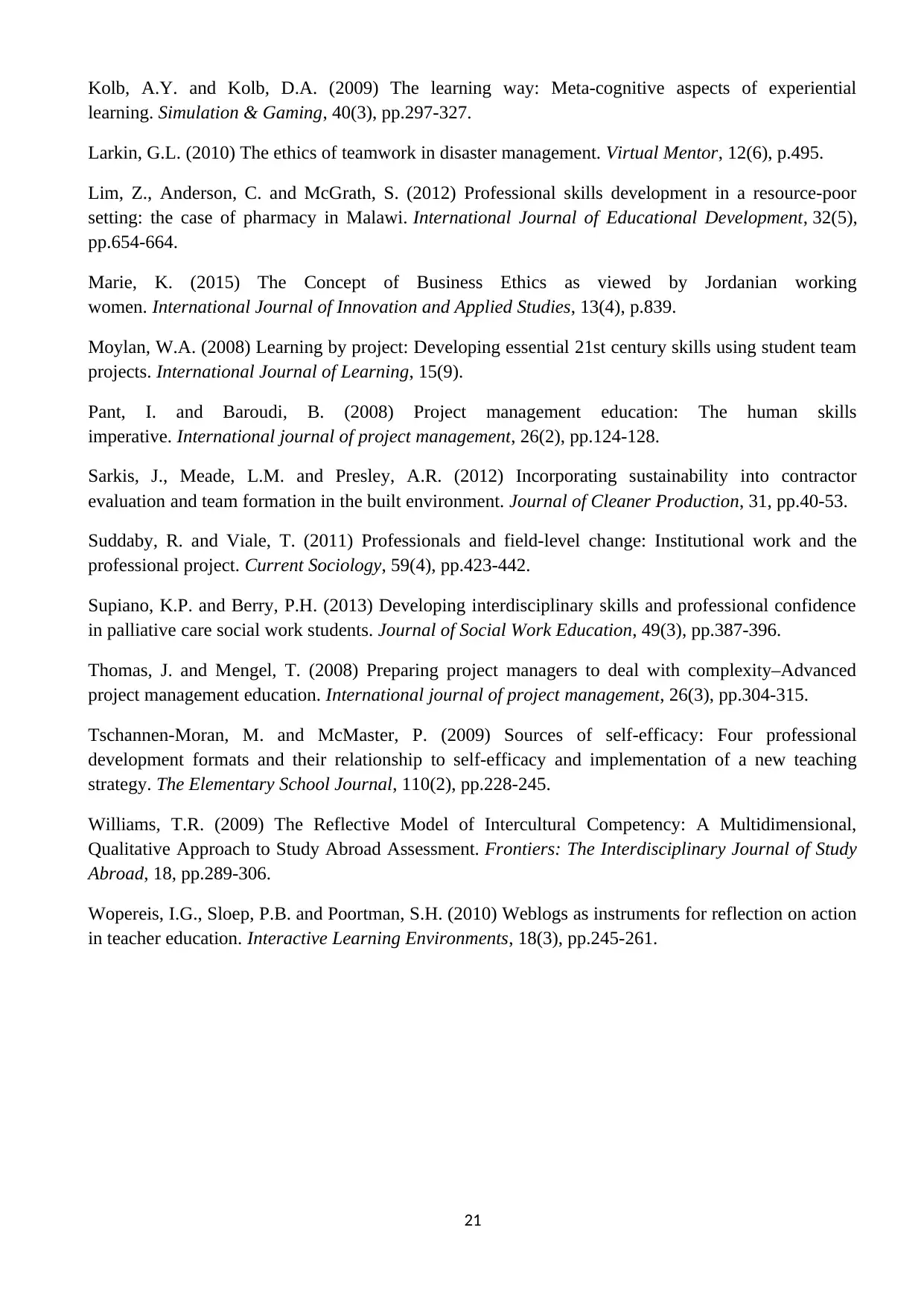
Kolb, A.Y. and Kolb, D.A. (2009) The learning way: Meta-cognitive aspects of experiential
learning. Simulation & Gaming, 40(3), pp.297-327.
Larkin, G.L. (2010) The ethics of teamwork in disaster management. Virtual Mentor, 12(6), p.495.
Lim, Z., Anderson, C. and McGrath, S. (2012) Professional skills development in a resource-poor
setting: the case of pharmacy in Malawi. International Journal of Educational Development, 32(5),
pp.654-664.
Marie, K. (2015) The Concept of Business Ethics as viewed by Jordanian working
women. International Journal of Innovation and Applied Studies, 13(4), p.839.
Moylan, W.A. (2008) Learning by project: Developing essential 21st century skills using student team
projects. International Journal of Learning, 15(9).
Pant, I. and Baroudi, B. (2008) Project management education: The human skills
imperative. International journal of project management, 26(2), pp.124-128.
Sarkis, J., Meade, L.M. and Presley, A.R. (2012) Incorporating sustainability into contractor
evaluation and team formation in the built environment. Journal of Cleaner Production, 31, pp.40-53.
Suddaby, R. and Viale, T. (2011) Professionals and field-level change: Institutional work and the
professional project. Current Sociology, 59(4), pp.423-442.
Supiano, K.P. and Berry, P.H. (2013) Developing interdisciplinary skills and professional confidence
in palliative care social work students. Journal of Social Work Education, 49(3), pp.387-396.
Thomas, J. and Mengel, T. (2008) Preparing project managers to deal with complexity–Advanced
project management education. International journal of project management, 26(3), pp.304-315.
Tschannen-Moran, M. and McMaster, P. (2009) Sources of self-efficacy: Four professional
development formats and their relationship to self-efficacy and implementation of a new teaching
strategy. The Elementary School Journal, 110(2), pp.228-245.
Williams, T.R. (2009) The Reflective Model of Intercultural Competency: A Multidimensional,
Qualitative Approach to Study Abroad Assessment. Frontiers: The Interdisciplinary Journal of Study
Abroad, 18, pp.289-306.
Wopereis, I.G., Sloep, P.B. and Poortman, S.H. (2010) Weblogs as instruments for reflection on action
in teacher education. Interactive Learning Environments, 18(3), pp.245-261.
21
learning. Simulation & Gaming, 40(3), pp.297-327.
Larkin, G.L. (2010) The ethics of teamwork in disaster management. Virtual Mentor, 12(6), p.495.
Lim, Z., Anderson, C. and McGrath, S. (2012) Professional skills development in a resource-poor
setting: the case of pharmacy in Malawi. International Journal of Educational Development, 32(5),
pp.654-664.
Marie, K. (2015) The Concept of Business Ethics as viewed by Jordanian working
women. International Journal of Innovation and Applied Studies, 13(4), p.839.
Moylan, W.A. (2008) Learning by project: Developing essential 21st century skills using student team
projects. International Journal of Learning, 15(9).
Pant, I. and Baroudi, B. (2008) Project management education: The human skills
imperative. International journal of project management, 26(2), pp.124-128.
Sarkis, J., Meade, L.M. and Presley, A.R. (2012) Incorporating sustainability into contractor
evaluation and team formation in the built environment. Journal of Cleaner Production, 31, pp.40-53.
Suddaby, R. and Viale, T. (2011) Professionals and field-level change: Institutional work and the
professional project. Current Sociology, 59(4), pp.423-442.
Supiano, K.P. and Berry, P.H. (2013) Developing interdisciplinary skills and professional confidence
in palliative care social work students. Journal of Social Work Education, 49(3), pp.387-396.
Thomas, J. and Mengel, T. (2008) Preparing project managers to deal with complexity–Advanced
project management education. International journal of project management, 26(3), pp.304-315.
Tschannen-Moran, M. and McMaster, P. (2009) Sources of self-efficacy: Four professional
development formats and their relationship to self-efficacy and implementation of a new teaching
strategy. The Elementary School Journal, 110(2), pp.228-245.
Williams, T.R. (2009) The Reflective Model of Intercultural Competency: A Multidimensional,
Qualitative Approach to Study Abroad Assessment. Frontiers: The Interdisciplinary Journal of Study
Abroad, 18, pp.289-306.
Wopereis, I.G., Sloep, P.B. and Poortman, S.H. (2010) Weblogs as instruments for reflection on action
in teacher education. Interactive Learning Environments, 18(3), pp.245-261.
21
1 out of 21
Related Documents
Your All-in-One AI-Powered Toolkit for Academic Success.
+13062052269
info@desklib.com
Available 24*7 on WhatsApp / Email
![[object Object]](/_next/static/media/star-bottom.7253800d.svg)
Unlock your academic potential
© 2024 | Zucol Services PVT LTD | All rights reserved.




